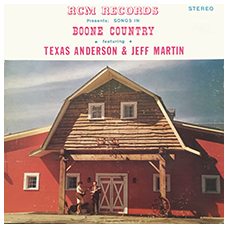 Texas Anderson & Jeff Martin "Songs In Boone Country" (RCM Records, 19--?) (LP)
Texas Anderson & Jeff Martin "Songs In Boone Country" (RCM Records, 19--?) (LP)
(Produced by Chan Strader)
This duo from Winchester, Kentucky played fairly hardcore, old-school country -- the emotive, declarative Jeff Martin sounds like a combination of Hank Snow and Mac Wiseman, a little stilted though compelling, while Texas Anderson sounds a lot like Kitty Wells. She's able to project and sort of force her way through a song, much like Kitty Wells did, although Anderson's phrasing often sounds off, and her vocals wobble a bit as a result. Sometimes the band is a little wobbly, too, so maybe tempo wasn't everybody's strong point here. That being said, I really this record -- the overall sound is stripped-down and rough-edged, but robust and soulful as well -- Martin, in particular, sells these songs. There are a lot of good cover tunes -- she wallops her way through "Just Walk On By," "Once A Day" and "You Ain't Woman Enough To Take My Man," and he covers Joe South's "Games People Play" in a hard honky-tonk style, to rather amusing effect. There's original material as well: five of the tracks were composed by the album's producer, Robert Channing Strader, a middle-aged Kentucky native who claimed direct descent from Daniel Boone and who approached the singing couple to see if they would record his songs for him. They seemed to have helped him rough them out a bit -- four of the tracks are also credited to T. Martin, which I think meant that "T" was for Texas and that she and Mr. Martin were married. There's also one song written by the guy who also contributed the liner notes, Herb Lewis, whose "Two Divided By One" is a fairly standard-issue love-triangle country weeper which, like some of Stradler's stuff, comes off as a little bit lyrically strained, though not at all unpleasant. After all the good-natured twang, the album ends up sharply veering course -- Ms. Anderson testifies her way through a churchy, gospel-oriented Strader-Martin tune, "The Golden Grains," which hints at what they hoped would be their next project, an album showcasing Strader's religious material. Did they ever make it? I dunno -- you tell me! (One quick footnote: Mr. Strader (1911-1991) was a well-regarded local farmer and insurance salesman who died a bachelor in 1991. In his will he donated to the State of Kentucky forty-seven acres of family land that had once been a settlement known as Boone Station, where Daniel Boone lived from 1779-1782. Mr. Strader also willed the state his collection of over 10,000 arrowheads, which were to be given to the Kentucky state parks system. Boone Station, where he had previously helped endow a historical marker, is now a state historic site which includes recreations of the old cabins and stockade walls. And he left us a few songs, as well.)
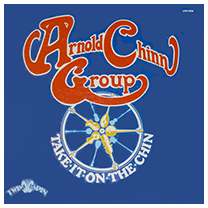 The Arnold Chinn Group "Take It On The Chin" (Twin Spin Records, 1978) (LP)
The Arnold Chinn Group "Take It On The Chin" (Twin Spin Records, 1978) (LP)
(Produced by Steve Chandler & The Arnold Chinn Group)
Oddly enough, there's no one in this band named Arnold Chinn -- not sure what the in-joke was there -- but there was plenty of twang. A decent pop-country band from Owensboro, Kentucky, these guys got together in 1974 and played throughout the decade. This early album sports a strong bluegrass-y streak that eventually faded out of the band's sound... In addition to several original tunes composed by various bandmembers, they cover country-rock classics such as Dan Hicks' "How Can I Miss (You When You Won't Go Away)?," "Oooh, Las Vegas" from the Gram Parsons songbook, and J. D. Souther's "Safe At Home." The band is joined on a couple of tracks by fiddler Buddy Spicher.
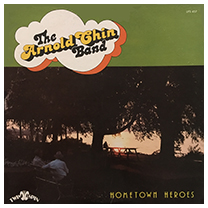 The Arnold Chin Band "Hometown Heroes" (Twin Spin Records, 1981) (LP)
The Arnold Chin Band "Hometown Heroes" (Twin Spin Records, 1981) (LP)
(Produced by Joe Hardy)
A nice album with a perceptible AOR influence, but firmly surrounded by a pronounced, slightly exaggerated hillbilly twang. It took me a while to place it, but finally (duh) I heard their similarity to country-rocker Rodney Crowell. Indeed, they had an almost-hit with a cover version of Crowell's "Ain't No Money," which got played on American Bandstand and is included on this album. Their allegiance to the sleek, hip style of Rodney Crowell/Emmylou Harris post-hippie neo-traditionalism gives them a distinctive sound, recreating yet refashioning their radio-friendly sound. There's definitely an almost-but-not-quite, woulda-coulda feel to this record -- it's amateurish in some ways, ambitious and assertive in others. Worth a spin, if you can track it down.
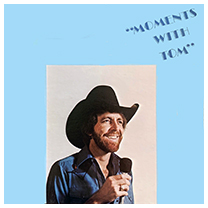 Tom Asbridge "Moments With Tom" (Square Records, 19--?) (LP)
Tom Asbridge "Moments With Tom" (Square Records, 19--?) (LP)
Originally from Marion, Kentucky, singer Tom Asbridge relocated to Memphis for a few years, and cut this album in Little Rock, Arkansas. A few years later, he made his way to Houston, Texas, where he's been ever since. This album includes some interesting cover songs, including a version of Chip Taylor's "Clean Your Own Tables," Sammy Johns' "Chevy Van" and yet another rendition of "Me And Bobby McGee," as well as a couple of tracks that may have been Asbridge originals.
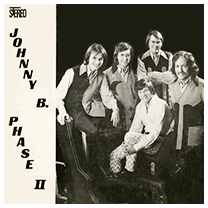 Johnny B. & Phase II "Rowntowner Motor Inn Presents..." (QCA Records, 1971-?) (LP)
Johnny B. & Phase II "Rowntowner Motor Inn Presents..." (QCA Records, 1971-?) (LP)
A super-cheesy and fairly amateurish lounge act, marked by schmaltzy, Tom Jones/Righteous Brothers-style vocals and thin-sounding horn arrangements, this disc was a souvenir of the Downtowner motel chain's suburban-oriented "Rowntowner" offshoot. Because this was a national chain, I'm not sure which particular branch Johnny B was working in at the time, but the album was pressed by the Cincinnati-based QCA plant, and locals newspaper ads show him playing at Rowtowners in nearby Fort Mitchell, Kentucky. No idea who Johnny B really was, though the other guys in the band are identified by name: Dave Laycock on drums, Tim Mullarkey (guitar), Bob Ridder (piano and organ) and Mike Wilshire on bass, and several of them played in previous and later bands, mostly on the Kentucky side of the river. Anyway, this early 'Seventies offering certainly is "of its time," as they say, and quite ripe for modern-day mockery... not that we would ever do such as thing. Though most of the songs are more pop-oriented, covers of Neil Diamond, Joni Mitchell and others, the Phase II guys did touch on some rootsy material, including covers of "Help Me Make It Through The Night," "Polk Salad Annie" and Gary Puckett's "Woman, Woman" (which I always thought sounded like a Mac Davis song). Not totally country, but close. (Thanks to the Appearing In The Motel Lounge blog for bringing this one to our attention...)
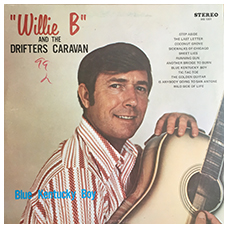 Willie B & The Drifter's Caravan "Blue Kentucky Boy" (Willie B Enterprises, 1973-?) (LP)
Willie B & The Drifter's Caravan "Blue Kentucky Boy" (Willie B Enterprises, 1973-?) (LP)
The Drifter's Caravan band was formed sometime around 1965 by a bunch of American servicemen and several likeminded German country pickers, including steel player Rex Saxton and drummer Rocky Wesle. Singer Willie B. Tyler came from Kentucky and did several USO tours with the band before returning to civilian life, where he played military NCO clubs and other regional gigs, eventually landing his own TV show on station WBKO, Bowling Green. First airing in 1972, The Willie B Show featured gal singer Becky Sue Bingham, with Tommy Davenport leading the band -- Davenport had also played piano and guitar in the original European group, and stuck with Tyler when he headed back home. After Davenport and Willie B went stateside, the German band chugged along under the leadership of bassist Jack Scudder, while Tyler kept the American group together straight through the late '80s, according to message boards out in the hillbilly blogosphere. Mr. Tyler apparently passed away in 2013. A nice, brisk set of back-to-basics country with thin, but charming vocals. (Note: though frequently listed as a 1972 release, this is likely a bit later, as the TV show debuted in September, '72, pretty late in the year.)
Kenny Baker -- see artist profile
Kathy Barnes -- see artist profile
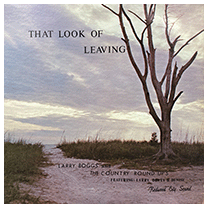 Larry Boggs & The Country Round-Ups "That Look Of Leaving" (Redwood City Sound, 1976) (LP)
Larry Boggs & The Country Round-Ups "That Look Of Leaving" (Redwood City Sound, 1976) (LP)
A charmingly flawed and ambitious album by a humble honkytonk band from Ashland, Kentucky. They sure played a bunch of drinkin' and cheatin' songs -- "Bottle And Bars," "Seagram Seven," "Secret Angel," etc. The quintet was led by singer Larry Boggs, along with Tom Dixon on bass, Dewey LeMaster playing rhythm guitar and Larry Boggs' sister, Denise Sweeney (aka Denise Gale Boggs Dowdy, 1954-2002) who was apparently married to drummer Mike Sweeney at the time. The general vibe seemed to be aiming for a Billy Sherrill-influenced countrypolitan/honkytonk ballads sound; Larry Boggs had a range of vocal styles, but returned most often to George Jones-ish crooning, while his sister echoes Loretta Lynn's backwoods twang. She struggled with diabetes her entire life, and is pictured on the back cover wearing shades, possibly due to visual impairment; the album opens with a song of hers that was also released as a single, the title track, "The Look Of Leaving," which sounds like a classic early-'Seventies countrypolitan duet. That track and many others were emblematic of the band's musical ambitions -- the album is not well-produced and sounds a bit thin, but the musicianship is fairly solid (other than one comedically "bad" novelty number, "Seagram Seven," with unidentified vocals by one of the boys in the band...) Definitely worth a spin if you're interested in what "real" local bands sounded like back then.
 Jay Bolotin "Jay Bolotin" (Commonwealth United, 1970) (LP)
Jay Bolotin "Jay Bolotin" (Commonwealth United, 1970) (LP)
Roger Bowling "Then I'll Stop Loving You" (NSD Records, 1983) (LP)
The lone solo album by songwriter Roger Bowling, a Harlan, Kentucky native who broke into Nashville in the 1970s after plugging away for years, and became one of the decade's most successful composers, penning two huge late-'Seventies hits for Kenny Rogers, "Lucille" and "Coward Of The County." Mr. Bowling (1944-1982) first moved to Nashville in 1970 but left after he decided he wasn't quite good enough to break into the highly-insular Music City scene of the countrypolitan era; he came back in '74 and placed song after song with stars such as Billie Jo Spears, Freddy Hart, George Jones and Tammy Wynette, finally striking gold with the 1977 crossover smash, "Lucille." Sadly, this album was released posthumously: Roger Bowling committed suicide by overdose the day after Christmas, having been diagnosed with terminal cancer a year before. The album includes his own version of "Lucille," as well as his own hit single, "The Yellow Pages," and some other songs that were recorded by various Nashville stars, such as "While The Feeling's Good" and "The Diplomat," an album track that Johnny Cash recorded in 1978.
Dale Ann Bradley -- see artist profile
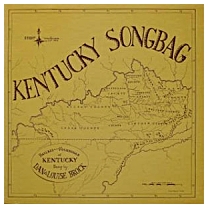 Dan Brock & Louise Brock "Kentucky Songbag" (Donerail Records, 1968) (LP)
Dan Brock & Louise Brock "Kentucky Songbag" (Donerail Records, 1968) (LP)
(Produced by Dan Brock)
This is one of the earliest examples of bluegrasser J. D. Crowe working as a bandleader, with Bobby Sloane and Doyle Lawson backing him up as the Kentucky Mountain Boys, the nucleus of the band that would later be called The New South. It's a slightly odd album, with fairly staid folksong vocals by Dan and Louise Brock, who cite the esteemed John Jacob Niles as their main inspiration... Their singing is hardly bluegrass style, but the shared history of the music helps bridge the gap, although the Mountain Boys keep mostly in the background, with Crowe's (or Lawson's) banjo being the most prominent instrument in the mix. They get to stretch out instrumentally on a couple of tracks on Side Two, but for the most part this is kind of a work-for-hire album. Nice set of Kentucky-related folklore, though, with a mix of standards and oldies from popular song (Stephen Foster, et. al.), gospel, and a few contemporary tunes like "Coal Tattoo." Definitely worth a spin!
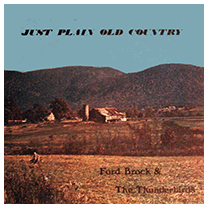 Ford Brock & The Thunderbirds "Just Plain Old Country" (Redbird Records, 1975-?) (LP)
Ford Brock & The Thunderbirds "Just Plain Old Country" (Redbird Records, 1975-?) (LP)
A locals-only hard-country set by a guy from Redbird, Kentucky. Though there are plenty of cover tunes on here, singer Ford Brock wrote some originals as well, notably the song "The Day She Said Goodbye" which he released as a single around the same time this album came out... He might have recorded an earlier version as well, since it was first copyrighted in 1968. The Thunderbirds seem to have been a real working band, since country star LaWanda Lindsey contributed glowing liner notes where she says she'd used them as a pickup band while on tour. The group included Jim Conley on bass, Roger Hubbard (lead guitar), Wayne Jones (drums), and steel player Lloyd Kremer; Brock's hometown pickers were joined by some folks at the Birch Recording Studio in Secretary, Maryland -- JoAnna Birch on piano, John Johnstone (rhythm guitar), Ed Smith (fiddle) and Billy West on banjo. Among the cover songs are "The Auctioneer," "Crazy Arms," "The Key Is In The Mailbox," "Rainy Day Woman," and one version of "Rocky Top," just for good luck.
Marty Brown -- see artist profile
Sam Bush -- see artist profile
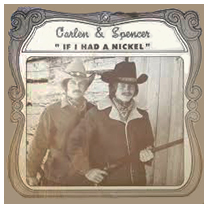 Carlen & Spencer "If I Had A Nickel" (1982) (LP)
Carlen & Spencer "If I Had A Nickel" (1982) (LP)
(Produced by Wayne Sexton)
Hugh Carlen and Greggory Spencer were a strummy acoustic duo from Buffalo, Kentucky who beefed out their sound with some zippy pedal steel licks, courtesy of Larry Williams... I guess technically this is twang, although their music had a predominantly gooey, strummy, naifish folk-funk vibe. The album was recorded at a studio sponsored by the Lincoln Jamboree, though I'm not sure if these guys were connected with the venue itself.
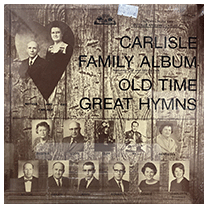 The Carlisle Family "The Carlisle Family Album: Old Time Great Hymns" (Old Homestead Records, 1982) (LP)
The Carlisle Family "The Carlisle Family Album: Old Time Great Hymns" (Old Homestead Records, 1982) (LP)
(Produced by Doug Taylor & Ken Friesen)
Fans of classic hillbilly blues will delight to find this archival recordings of the extended family of Depression-era icons Bill and Cliff Carlisle, two pioneers of Kentucky country who found widespread regional fame in the 1930s and '40s and -- in the case of Bill Carlisle -- national fame and a slot on the Grand Ole Opry. This set was a humbler offering, a back-to-basics religious set featuring family members Charlotte, Connie, Henrietta, Jerry, Louis, Marion, Milton, Regenia and Ronnie (whose exact relationships to the brothers are unknown to me). The tracks were originally recorded for the REM Records label, but went unreleased until a tape was provided to the folks at Old Homestead, many years later.
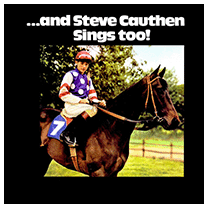 Steve Cauthen "...And Steve Cauthen Sings Too!" (Bareback Records, 1977-?) (LP)
Steve Cauthen "...And Steve Cauthen Sings Too!" (Bareback Records, 1977-?) (LP)
An odd celebrity album recorded by teenage jockey Steve Cauthen, a kid from Kentucky who was at the height of his fame as a rider, having dominated American horse racing in 1977, and winning the Triple Crown in 1978 on the champion colt named Affirmed. Musically, this isn't really any great shakes -- it's basically tinny, treble-heavy country-meets-bubblegum tunes, with nondescript pop arrangements framing Cauthen's light, fairly inexpressive vocals. He sounds young, but not very expressive. This has kind of a Partridge Family/Osmonds feel to it, though there is a persistent country undercurrent, with bluegrass banjo on the opening track and some pretty sweet pedal steel throughout the album. (Anyone know who was the steel player on this album, or any of the other musicians?) Anyway, fans of 'Seventies pop-rock kitsch might dig this, though country fans won't have much to sink their teeth into... Cauthen was a wildly successful rider, though he moved into European competition starting in 1979, riding in the UK and on the Continent up into the early 1990s.
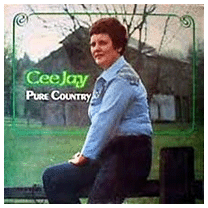 Cee Jay "Pure Country" (Amoura Records, 1980) (LP)
Cee Jay "Pure Country" (Amoura Records, 1980) (LP)
(Produced by Nelson Shaw, Olen Bingham & Kevin McManus)
A very-indie set from songwriter Carolyn June Hester, who wrote all the songs on here, with all but two being co-composed with producer Nelson Shaw. Not to be confused with the 'Sixties folk-scene icon Carolyn Sue Hester (who came from Texas) Cee Jay was a Kentucky gal, and claims to have been "kin" to fiddler Hubert ("Hoot") Hester, although the relationship isn't made clear. He plays on this album, along with several other Nashville A-listers -- guitarist Jimmy Capps, Steve Chapman (guitar), Buddy Harmon (drums), Billy Linneman (bass), Charlie McCoy (harmonica), Weldon Myrick (steel guitar), and Jerry Whitehurst on piano, as well as a later edition of the Sound Seventy Singers vocal group. At least two singles were broken off this album and distributed by the NSD company, including "Truck Drivin' Mama" and "Take Your Love And Shove It," although as far as I know, this was the sum total of her work, at least under the Cee Jay alias.
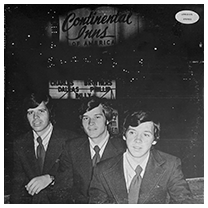 The Charles Brothers "The Charles Brothers" (Lemco Records, 1973) (LP)
The Charles Brothers "The Charles Brothers" (Lemco Records, 1973) (LP)
(Produced by Lou Zechella & Cecil Jones)
These three Kentucky siblings, Billy, Dallas and Phillip Charles, were a rock solid bluegrass combo holding down a gig with Continental Inns chain in Lexington, Kentucky at the time this album was recorded. The hotel's manager, Lou Zechella, produced the album and contributed liner notes as well. The repertoire is all cover songs, with a few country tunes in the mix, including Merle Haggard's "Daddy Frank" and "Roll On Buddy" from the Wilburn Brothers, as well as a nice version of Tony Hazzard's "Fox On The Run," which was part of the progressive bluegrass canon at the time. This is more straight-up bluegrass than most of my locals-only listings, but I can't resist: I'm a sucker for a lounge-music twang LP.
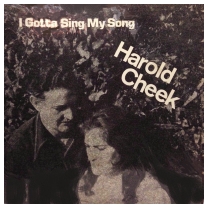 Harold Cheek "I Gotta Sing My Song" (Tom Tom Records, 19--?)
Harold Cheek "I Gotta Sing My Song" (Tom Tom Records, 19--?)
(Produced by Harold Cheek & Chuck Thompson)
There's no real info included on the album art, but I believe this singer was Harold Dean Cheek (1937-2015) of Middlesboro, Kentucky -- he also released a single on the Tom Tom label, billing himself as "the Singing Kentuckian." That single included two original songs, "Big Brite Moon" and "Love I Can't Forget," though sadly neither are included here. Mostly this is a set of covers, although there are a couple more Cheek tunes, "Heaven Came Back To Me" and "If Time Can Heal Pain," along with covers of country standards such as "Big Iron," "Green Green Grass Of Home," "I'm So Lonesome I Could Die" and the classic saucy cheatin' song, "Lonely Women Make Good Lovers." Nice, jaunty arrangements, and a definite affinity for the old classic Marty Robbins sound. No musician credits, either, but Cheek is pictured on the front and back with a gal identified as Jackie Cheek, and he's also seen feeding a couple of cows, so he may have had a ranch or kept a few animals. Other than that, a complete mystery.
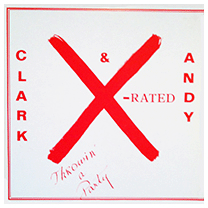 Clark & Andy "Throwin' A Party" (Ancor Records, 197--?) (LP)
Clark & Andy "Throwin' A Party" (Ancor Records, 197--?) (LP)
(Produced by Andy Rucker & Paul Osborne)
A comedic "party" album recorded live at an informal session in Winchester, Kentucky by the duo of Andy Rucker and Clark Whitt. They cover a lot of fun stuff -- three Shel Silverstein songs, a version of John Prine's "Please Don't Bury Me" and yet another rendition of Ray Wylie Hubbard's "Redneck Mother." There's also stuff by Red Lane and Jim Stafford, and one original song written by Clark Whitt, "Irma Jean." Not sure exactly when this was recorded, but late '70s/early '80s seems like a good bet.
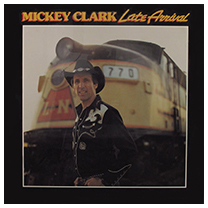 Mickey Clark "Late Arrival" (Evergreen Records, 1987) (LP)
Mickey Clark "Late Arrival" (Evergreen Records, 1987) (LP)
(Produced by Turley Richards & Johnny McRae)
This album's title (and the label name) are testaments to Mickey Clark's long, long musical career... In his expansive liner notes, Jerry Jeff Walker remembers meeting him in 1964 when Clark was a member of the Kentucky-born but New York-based folk trio The Village Singers, and recounts various times over the years when they reconnected, including a stint in the late 'Seventies when Clark had moved to Texas. Somewhere along the line, Mickey Clark tried his luck in Nashville, and managed to score a few successes as a songwriter, including a few tunes recorded by the Oak Ridge Boys. One song, "She's Gone To LA Again," is included on this album, along with others that Clark released earlier as singles. A native of Louisville, Clark moved back to Kentucky in the '80s and became a local icon known for penning several anthems for the local University of Louisville men's basketball team, most notably one called "Cardinal Cannonball." Clark passed away in 2018 in Louisville, at age 78.
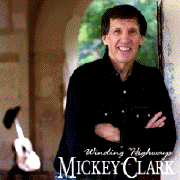 Mickey Clark "Winding Highway" (Ear-X-Tacy, 2009)
Mickey Clark "Winding Highway" (Ear-X-Tacy, 2009)
(Produced by Jim Rooney)
A thoroughly charming outing with a warts-and-all cragginess, with plenty of dusty country wit and grit, and a slew of high-power guest performers. Swapping verses with Clark on the delightful "Don't Piss On My Boots (And Tell Me It's Raining)" are three alt-twang luminaries: Kinky Friedman, John Prine and Jerry Jeff Walker, who all take great and obvious delight in the song's raunchy good humor. Walker also sings on "Goodnight Loving Trail," which was written by the late, great U. Utah Phillips, and is one of the few songs on the album not written or co-written by Clark. Other highlights include the bittersweet "Sarah," and the robust "Tijuana Tequila." Another nice record for those who are looking for an earthier alternative to the pop slickness of the Nashville charts, particularly those country fans who enjoy Jerry Jeff's brand of relaxed, ribald tunesmithing. Good stuff.
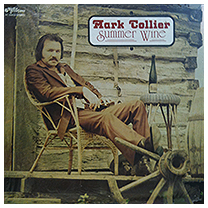 Mark Collier "Summer Wine" (Audio Creations, 197--?) (LP)
Mark Collier "Summer Wine" (Audio Creations, 197--?) (LP)
(Produced by Ben Harris)
Good, robust neotrad honkytonk in the same wheelhouse as Merle Haggard and Gene Watson... Collier appears to have been from Paducah, Kentucky, and led his band at least through the early 'Eighties. This album features four originals by Collier: "Go On Girl," "Heart, It's Over," "Little Things," and "You Took Me Back Again," along with covers os Lee Hazelwood, Waylon Jennings and Willie Nelson, as well as providing yet another version of Marty Robbins' "You Gave Me A Mountain." He's backed here by Ed Glass on drums and guitar, Wade Hamlett (bass), Mike Kellough (piano), Howard Walker (steel guitar) and Stanley Walker playing lead. Information on Collier was surprisingly scant online; he retired from show business in the 'Eighties, but (assuming its the same guy) later became a producer and promoter, starting his own label in 1999, the now-defunct MMG Records.
John Conlee -- see artist profile
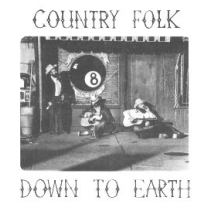 Country Folk "Down To Earth" (Mugtime Records, 1976) (LP)
Country Folk "Down To Earth" (Mugtime Records, 1976) (LP)
(Produced by Turley Richards)
This album was a collaboration between Louisville, Kentucky songwriters Bill Clark (who also played fiddle and guitar) and John Gage (dobro and guitar) with over half the songs being original material. They cover Woody Guthrie, the Beatles, the Byrds and do a version of Ray Wylie Hubbard's "Up Against The Wall, Redneck Mother," though twangaholics might be even more drawn to the band's own songs, such as "Tennessee Mountain Hideout" and "Small Town Waitress." Gage went on to record several cassettes -- and later CDs -- in the 1980s, '90s and '00s, as well as doing community theater with the Kentucky Theater Project... I think this was his first album.
 Country Rhoads "In The Back Of Pappy's Truck" (Roymac Records, 1982) (LP)
Country Rhoads "In The Back Of Pappy's Truck" (Roymac Records, 1982) (LP)
(Produced by Vern Deaton)
Marge and Debby Rhoads were a mother-daughter duo from Paradise, Kentucky who brought a wealth of original material with them to this Nashville session, cut with bluegrass legend Jesse McReynolds at the helm and on mandolin. About half the songs are Rhoads originals, alongside covers of oldies by Bradley Kincaid, the Everly Brothers and a version of Dolly Parton's classic, "To Daddy." Also in the studio band are Josh Graves on dobro, Tim Crouch playing fiddle, and Mike Lattimore on banjo.
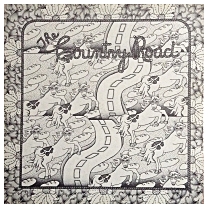 The Country Road "Our Very Best" (Renee Records, 19--?) (LP)
The Country Road "Our Very Best" (Renee Records, 19--?) (LP)
(Produced by Charlie Hall & Bobby Ernspiker)
This longhair lounge band from Lexington, Kentucky was playing a place called the Bonanza Inn when they cut this album. It's a mix of covers and original material, ranging from bluegrass oldies like "Banks Of The Ohio" to R&B warhorses such as "Susie Q." The band was led by guitarist Bill Lester, backed by brothers Frank Curtis, on piano and organ and Larry Curtis on bass, Joe Weber playing fiddle and Jim Boggess on banjo. They were also in the orbit of Ward Darby, another longhair bandleader who put out a few records in the late 1970s -- he's listed as a "technical advisor" on this album. The main vibe is bluesy white soul, though there is a Charlie Rich-ish country feel as well. They were a little sluggish in their delivery, but it's a charming album nonetheless because this is so clearly the kind of music they liked, played the way they wanted to play it.
The Country Trend "Keepin' It Country With The Country Trend" (Shadow Records, 1979) (LP)
(Produced by The Country Trend & George Cumbee)
Mostly country covers from this Paducah, Kentucky-adjacent band, with a trio of original tunes, including two by steel player Jerry Burkeen ("I Keep Wonderin'," "I Told You So") and one by lead singer Kathy Reid ("I'm To Blame"). The group also included singer Dianne Clark, lead guitar Jeff Dowdy, drummer Don Housman, Dale Reid on guitar and bassist Neil Vick. I'm not sure how professional of a group this was, though the back cover shows them performing on a pretty fancy-looking bandstand; as far as I know this was their only album.
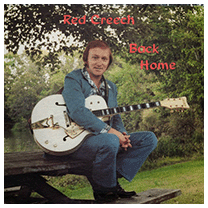 Red Creech "Back Home" (Clark Country Records, 1977-?) (LP)
Red Creech "Back Home" (Clark Country Records, 1977-?) (LP)
(Produced by Delbert Barker & Delbert Barker, Jr.)
Born in Kentucky, Bill "Red" Creech grew up listening to the Grand Ole Opry and idolizing hotshot guitar heroes like Chet Atkins and Merle Travis... After years of pickin' locally, he landed a gig as a cast member of the Renfro Valley Barn Dance, performing onstage in the house band and in their gospel group, The Home Folks Quartet, as well as on the Barn Dance's Morning Gatherin' radio show. He did session work on several albums, including this solo set which features Red Creech on lead guitar and vocals, Roy Cook (drums), David Creech (piano), Chubby Howard (steel guitar), Steve Lake (bass), Pam Temple (backing vocals), and Billy Thomas playing fiddle. The repertoire was mostly country classics, though there's one original, "Sunday Dreamer's Fool," penned by Gary Mobley. Mr. Creech also released at least one single on the Clark Country label, a 1977 release featuring Bill Anderson's "That's What It Takes To Be Lonesome," backed by an old Merle Travis instrumental, "Cannonball Rag," which might be the same version heard on this album. Red Creech settled down in Loveland, Ohio, though he seems to have moved out of show business in later years.
J.D. Crowe -- see artist profile
Billy Ray Cyrus - see artist discography
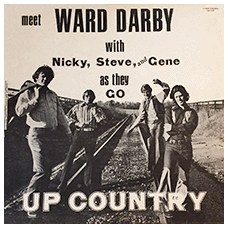 Ward Darby "(Meet Ward Darby With Nicky, Steve And Gene As They Go) Up Country" (Lemco Records, 197-?) (LP)
Ward Darby "(Meet Ward Darby With Nicky, Steve And Gene As They Go) Up Country" (Lemco Records, 197-?) (LP)
(Produced by Cecil Jones)
Electric guitar picker Ward Darby (1939-2019) was a real twangtune Zelig, playing country and gospel as a kid, then plugging in and going rockabilly as the pop music landscape changed during his teens. Way back in 1959, he was playing gigs in Pennsylvania when his band The Raves recorded a crude, earthy rock-instrumental single ("Safari"/"Wham-O") that got picked up by Dot Records and distributed nationally... He tried a few other permutations of the garage rock gig, including one band called The Jaguars, where he backed a young Charlie Daniels, but nothing really clicked and gradually he moved back into playing country music. Although he was born in West Virginia, he worked and lived all across the Rust Belt, the Midwest and the South, perhaps most notably when he owned a music venue called the Nightlife, in Lexington, Kentucky around the time he made this album. As the 'Seventies closed, Darby moved down the Florida and eventually settled down in Branson, Missouri, where he played country music, oldies and gospel, and self-released at least two albums during the digital era. As far as I know this was his first full album, a mix of original material and covers of contemporary hits like Freddie Hart's "Easy Lovin'."
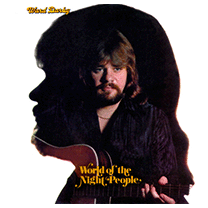 Ward Darby "World Of The Night People" (1978) (LP)
Ward Darby "World Of The Night People" (1978) (LP)
(Produced by Ward Darby, Bobby Ernspiker & Cecil Jones)
A weird amalgam of Southern rock and disco-y AOR, with kind of a hopeful nod towards the world of Lynyrd Skynyrd. This is actually more of a 6-song EP, with two versions of the song, "Gunslinger," which is kind of a straightforward (if somewhat sluggish) boogie-rock/southern booze tune. There's also some outright disco-pop ("World Of The Night People") and an odd jazz-ish instrumental ("Midnight Mystery.") Mostly, this kind of seems like a misfire, though maybe it felt different if you were there back then. Didn't really wow me, but you can see what he was aiming for...
Ward Darby "Old Gospel Guitar" (2012)
(Produced by Ward Darby)
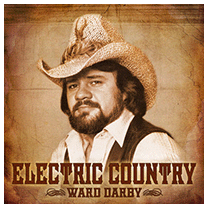 Ward Darby "Electric Country" (2019)
Ward Darby "Electric Country" (2019)
(Produced by Ward Darby)
This twangy epitaph closes out Darby's early country career... It's an odds-and-ends collection of four tracks recorded with a professional Nashville crew, back in 1982, when he was living in Florida, and a couple of other tracks he cut in 1988, while back in Kentucky, and two more tunes that came out as a single in 1974. Two songs, "Truck Drivin' Women" and "Melinda," were released as a single.
 Larry Denham & The Cowboy Ramblers "I've Sang The Blues So Long" (Adler Records, 19--?) (LP)
Larry Denham & The Cowboy Ramblers "I've Sang The Blues So Long" (Adler Records, 19--?) (LP)
(Produced by Stan Louden)
Kentucky native Larry Denham played in and around Louisville for several decades, cutting uptempo, rockabilly-tinged singles as a teen before settling into a more robust honkytonk baritone style. As heard on this album, his appreciation for classic country ran deep: the LP showcases four Hank Williams oldies, along with a slew of Denham originals, with Denham's vocals evoking Hank, Jr. to a surprising degree. He's backed here by several locals, including Dennis Beard on drums, bassist Larry Karr, and a well-respected steel guitarist named Boogie Sherrard, a fellow Kentuckian who had toured with Ray Price in the early '60s. The artwork is super-DIY, with a plain white back cover, and little info about Denham or his band, and alas does not include a release date. (Note: there seem to be a number of musically-inclined Larry Denhams listed online, and I'm not sure how or if they are all connected. A piano player named Larry Denham did session work with a few mainstream country musicians in the early 'Sixties as well as a stint with the Plainsmen southern gospel group from 1962-64, and there's also a steel player by the same name who was an old-timer playing local venues such as the "Bardstown Opry" and the "Shepardsville Country Music Show" at least as late as 2015. The same guy? Relatives? Anyone out there who might be able to help sort it all out?)
 Clyde And Marie Denny & The Drifting Kentuckians "Monticello" (Country Star, Inc., 1977) (LP)
Clyde And Marie Denny & The Drifting Kentuckians "Monticello" (Country Star, Inc., 1977) (LP)
(Produced by Gordon Reid & Carmine Lombardo)
Independent bluegrass with a country-ish fling... Most of the songs are Denny originals, though the Dennys get the trad stamp of approval, with old-timer Carl Story providing laudatory liner notes. The label was from Franklin, Pennsylvania, and I imagine the Dennys lived there as well, or at least nearby.
Dixie Line Band "Everything It Takes" (1984) (LP)
A pop/honkytonk band from Bowling Green, Kentucky comprised of local musicians who had previously worked in road band led by stars such as Bobby Bare, Willie Nelson and Jerry Jeff Walker. Around 1980, they formed their own band for local gigs, and recorded this lone album in '84.
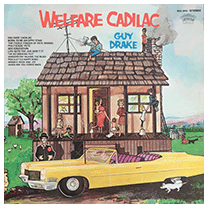 Guy Drake "Welfare Cadillac" (Royal American Records, 1970) (LP)
Guy Drake "Welfare Cadillac" (Royal American Records, 1970) (LP)
(Produced by Don Hosea)
A lethargic country comedy album with a distinctly conservative political bent... The title track features a recitation backed by a sedate country band, and is based on the persistent myth about welfare "cheats" who were filing multiple claims, stockpiling huge amounts of cash, and buying houses and cars with all that dough. Of course, that's all total BS, but the myth lives on, and a few years later, Ronald Reagan would use the story of a "welfare queen" living high on the hog while hard-working taxpayers had to foot the bill. Kentucky-born Guy Drake scored a minor hit with this tune, and on this full-length album also commented upon politics, sex education, anti-smoking campaigns and other timely topics. He also covered the faux-hick big band-era oldie, "Life Gets Tee-Jus, Don't It," and poked fun at the music business with tunes like "Songwriter Talking The Blues" and "Born To Be An Opry Star."
Frank Durbin "Originals: Swingin' Country" (Merryman Records, 1969-?) (LP)
Guitarist Frank Durbin was an unreconstructed hillbilly twangster, born in Ohio County, Kentucky, a comedic singer with a taste for gangly, uptempo novelty numbers reminiscent of Grandpa Jones or Porter Wagoner, but with plenty of electrified twang. He's backed on this all-original album by several teens from a local highschool, Limestone HS in Bellvue, Illinois -- Terry Henderson (bass), Tim Rudd (drums), and Doug Walraven playing organ. The album also mentions guitarist and comedian Big Ben, and many of the songs are co-credited to Big Ben, although that may have been some kind of alter-ego for Durbin. Not a ton of info about this guy, but the music is fun!
Wes England & The Country Express "In Nashville" (Artist Recordings, 1972) (LP)
(Produced by Russ Allison, Gene Eichelberger & Jess Thorpe)
An all-original set of secular country from honkytonker Wes England, a native of Augusta, Kentucky who may also have played around in Cincinnati, Ohio... England apparently had his own band back home, but when he traveled to Nashville to cut this album at Nugget Studios, he booked an A-list studio crew that included Stu Basore on steel guitar, Jimmy Capps (lead guitar), Jim Isbell, Bill Linneman, Willie Rainsford, Troy Seals, and even Mac Rebennack (aka Doctor John) sitting in on piano... I couldn't find much info about Mr England, though I think he's the same guy who cut the gospel album below, as well as a few singles, both religious and secular. A local newspaper clipping from February 20, 1971 lists his hometown band members as Wes England on lead vocals, Paul Mefford (bass), Bobby England (lead guitar), and Dave England on drums. (Thanks to The Bracken County Area Musician Appreciation Society for filling in a few blanks and leading us to the right town.) Any further info would be welcome!
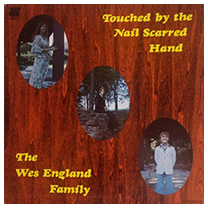 The Wes England Family "Touched By The Nail Scarred Hand" (Artist's Recording Company, 19--?) (LP)
The Wes England Family "Touched By The Nail Scarred Hand" (Artist's Recording Company, 19--?) (LP)
(Produced by Tom Baker & Vic Clay)
An all-gospel set, featuring songwriter Wes England along with his wife and son (who oddly enough are pictured, but not named on the album...) With the sole exception of Dottie Rambo's "Build My Mansion," the songs are all Wes England originals, including "Home Is Just A Heartbeat Away," "I Gave Up Nothing" and "Today's The Tomorrow." The Englands are backed by a studio crew made up of producer-guitarist Vic Clay, Chris Lee on piano, Chuck Rich on steel guitar and drummer Tim Short. Although there are few liner notes, per se, we do learn that when this album came out, the family was living in Sharonville, Ohio, a suburb just north of Cincinnati.
The Everly Brothers - see artist discography
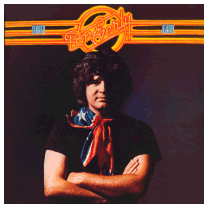 Don Everly "Brother Jukebox" (ABC/Hickory Records, 1977)
Don Everly "Brother Jukebox" (ABC/Hickory Records, 1977)
An endearing, if somewhat uneven, solo album by this much-beloved Everly brother. Going all-out country/countrypolitan on this one, Don hits a home run with the title track -- his definitive rendition of Paul Craft's "Brother Jukebox" has one of the greatest singalong choruses ever committed to wax, and remains one of my favorite lost-nugget country oldies... The rest of the album is much iffier, though, with Everly straining at the edges on more than a few of these songs, especially the more sensitive, emotive ballads. Still, it's worth it for the one song, and intriguing for devoted Everly fans and idle bystanders as well... Great song!
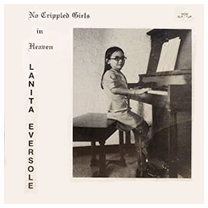 Lanita Eversole "No Crippled Girls In Heaven" (RCM Records, 1976) (LP)
Lanita Eversole "No Crippled Girls In Heaven" (RCM Records, 1976) (LP)
(Produced by Bill Martin & Texas Martin)
I imagine this old gospel album has some cache among those folks who are into "weird" album covers, though there's some real country picking on here as well. Born in 1962, Lanita Eversole was a thirteen-year old pianist and singer from Richmond, Kentucky who as a result of an undisclosed malady had already undergone thirteen "major" operations by age 13, and for most of her life had been wearing cumbersome leg braces, which are pictured on the front cover. Early on, she turned towards singing and performing gospel music as a form of solace and service. She's backed on this album by several local musicians, notably RCM label owner/producer Bill Martin and his extended family, a studio group that included Ms. Eversole on piano and vocals, along with David G. Crim (dobro), J. Lewis (steel guitar), Bill Martin (mandolin and guitar), Pam Martin (tambourine), Paul Martin (piano, bass and drums), Texas Martin (rhythm guitar), David Refflitt (electric guitar). Some of these musicians recorded elsewhere, notably Texas Martin (formerly Texas Anderson) who had previously recorded an album of her own on the RCM label; picker David G. Crim, who was in a bluegrass band called the Red River Boys, which also cut an album for RCM around the same time this disc was made. Year later, Bill Martin's son, Paul, joined the top forty country band Exile (which also hailed from Richmond, KY), and was the group's lead singer from 1990 until they broke up in 1993; he later joined Marty Stuart's band. Lanita Eversole went on to complete college and have a professional career, though she also continued on as a gospel artist, writing original music and appearing on various evangelical revival programs. Her parents, Carole and Walker Eversole, also sing on this album.
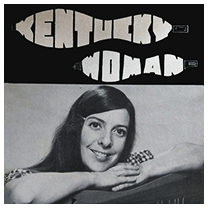 Nancy Eversole "Kentucky Woman" (Artists Recording Company/Custom Fidelity Records, 1973-?) (LP)
Nancy Eversole "Kentucky Woman" (Artists Recording Company/Custom Fidelity Records, 1973-?) (LP)
A straight-up set of old Appalachian folk tunes, somewhat in the bluegrass orbit, performed by dulcimer player and vocalist Nancy Pigman Eversole, who grew up in Lexington, Kentucky, but was living in Mishawaka, Indiana when she began her recording career. I'm not sure if she was any direct relation to Lanita Eversole (above) although Lexington and Richmond, KY are pretty much adjacent; Nancy Eversole also informs us that her father grew up in rural Knott Country, and her husband Ron Eversole was from "a neighboring mountain county," so it's possible there was some connection. Mrs. Eversole recorded at least three albums of similar material, and seems to have cultivated a persona as "the Kentucky Woman," which she used on more than one album. The title track is an original, and she also sings one by Billy Edd Wheeler, though all the other songs are public domain oldies. This album came out in two different editions, though I'm not sure which came first.
Nancy Eversole "Come By The Hills" (Lemco Records, 1979-?) (LP)
Another album, this time recorded for a bluegrass label, though still mainly folkloric material.
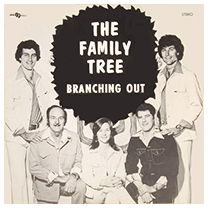 Eddie Fannon & The Calvary Singers "After Calvary" (Jewel Records, 1972-?) (LP)
Eddie Fannon & The Calvary Singers "After Calvary" (Jewel Records, 1972-?) (LP)
(Produced by Reggie Wallace)
A hardcore country gospel set from Kentucky bluegrasser Eddie Fannon, backed here by Bruce Andrews (banjo and lead guitar), Hiram Andrews (rhythm guitar), Tim Cook (rhythm guitar), Paul Harkins (bass). Mr. Fannon was originally from Harlan, Kentucky, but was living in the Cincinnati suburb of Norwood, Ohio at the time this album was recorded.
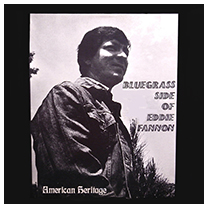 Eddie Fannon "The Bluegrass Side Of Eddie Fannon" (American Heritage Records, 1980)
Eddie Fannon "The Bluegrass Side Of Eddie Fannon" (American Heritage Records, 1980)
(Produced by The Family Tree & Dana Thomas)
I'm not 100% sure it's all the same guy, but as near as I can figure Eddie Fannon recorded at least one (really great) secular country single, in sort of a Moe Bandy-ish vein, as well as several gospel albums after he got born-again in 1981, and this bluegrass LP, which was recorded at the Vetco Studios in Cincinnati. Somewhere along the way he also cut a Hank Williams tribute song, "Hank's Gibson Guitar." Fannon was originally from ultra-rural Harlan County, Kentucky but later moved to Newport, Kentucky, a Cincinnati suburb on the other side of the state. He's backed on this album by Duke Bellamy on dobro, David Pinson (guitar), Evelyn Reed (bass), Jeff Roberts (banjo), Dusty Rose (fiddle) and Jeff Terflinger on fiddle and mandolin. (Roberts and Terflinger were both members of the Katie Laur band; the others seem to have been Cincinnati-area locals as well, including Dave Pinson, who played with Buddy Griffin, another Laur alumnus...)
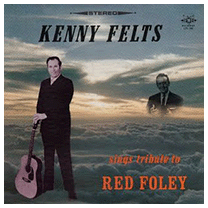 Kenny Felts "Sings Tribute To Red Foley" (Jewel Records, 1970-?) (LP)
Kenny Felts "Sings Tribute To Red Foley" (Jewel Records, 1970-?) (LP)
(Produced by Rusty York)
A country gospel set paying homage to Red Foley... All but three of the songs were originally from Foley's extensive back catalog, with the exceptions being "Downward Road Of Sin," written by guitarist Dennis Hensley, Oral C. Roberts' "The Touch Of Heaven" and a Dottie Rambo tune called "The Next Step You Take." Mr. Felts hailed from Corbin, Kentucky and traveled to Cincinnati to record this at the Jewel Records studio, with help from Chester Barnett on bass, Junior Bennett (violin), Junior Boyer (steel guitar), Dennis Hensley (guitar), Gene Lawson (drums) and pianist Denny Rice. Kenny Felts also cut a few gospel singles in the early 'Sixties, though folks in the know place this disc as having come out around 1970.
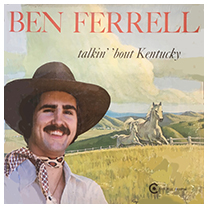 Ben Ferrell "Talkin' 'Bout Kentucky" (Caravelle Records, 1976) (LP)
Ben Ferrell "Talkin' 'Bout Kentucky" (Caravelle Records, 1976) (LP)
(Produced by Tony Migliore & Jim Matthews)
Although he sang about the bluegrass state, songwriter Ben Ferrell seems to have pitched his tent out in California, or at least he hooked up with the Hollywood-based Caravelle label, which bankrolled this disc. All the songs are originals, except for a version of Stephen Foster's "Old Kentucky Home," and the backup band includes a lot of top Nashville talent, folks like Harold Bradley, Pete Drake, Lloyd Green, Johnny Gimble, Charlie McCoy and Pete Wade... and they definitely get pretty funky on this album! I mean that literally. The whole "Area 615" crew really let their hair down here, playing some wicked funk and almost acid-rock-like riffs on some of these songs. But it is for sure also twangy and country as well. Pretty frickin' cool, really. Perhaps even a "lost 'Seventies gem. Apparently this was re-released in Australia under the same title, and with the same track sequence. By the early 'Eighties, Ferrell cut his hair and got religion... He still made records, including several in the CD era, but they were part of the "worship music" scene, as he calls it. He also moved to Tulsa... Not sure if he's a relative of Will Ferrell and his dad Lee, but it does seem likely.
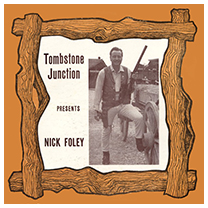 Nick Foley "Tombstone Junction Presents Nick Foley" (TJ Records, 1970?) (LP)
Nick Foley "Tombstone Junction Presents Nick Foley" (TJ Records, 1970?) (LP)
(Produced by Howard White)
A Kentucky-born country singer and actor, Nick Foley started his career in his teens as a performer at the Renfro Valley Barn Dance, where he eventually became the emcee, as well as the host of regional radio and TV programs such as the Skylight Cavalcade a nationally syndicated TV show. He also had a steady gig at the Tombstone Junction "old west" theme park, which was sort of Kentucky's answer to Silver Dollar City. This short, eight song album is half covers, half originals, with versions of Leon Ashley's "Laura," Conway Twitty's "Hello Darlin'," "Green Green Grass Of Home" and "Peace In The Valley" alternating with four of Foley's own songs: "I'm A Horse's Tail," Love On My Side" "What Is Life," and "Sometimes A Mountain." As far as I know, this was Foley's only album and while I'm not sure how long he was at Tombstone Junction, the park itself was a popular venue throughout the 1970s, but closed in 1991 after a fire razed it to the ground.
Jim Ford "Harlan County" (White Whale Records, 1969) (LP)
Kentucky native Jim Ford (1941-2007) made his way out west to California to become modestly successful Top Forty songwriter in the early 1970s. Penning pop, rock, and soul hits for established artists, on his own albums he crafted an odd mix of country and pop. Most of Ford's solo work has been reissued posthumously, with Harlan County being the only "proper" album issued during his lifetime...
Jim Ford "The Sounds Of Our Time" (Bear Family, 2007)
Jim Ford "Point Of No Return: Previously Unissued Masters, A Lost 45 & Rare Demos" (Bear Family, 2008)
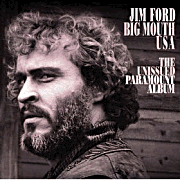 Jim Ford "Big Mouth USA -- The Unissued Paramount Album" (Bear Family Records, 2009)
Jim Ford "Big Mouth USA -- The Unissued Paramount Album" (Bear Family Records, 2009)
A tantalizing set of material from one of the odder characters on the 1970's twang scene. Songwriter Jim Ford was a pal of funk-soul pioneer Sly Stone; he played on some Sly & The Family Stone albums, as well as other iconic rock and pop records, but he nurtured an abiding love of country music, and wrote some truly stunning original twang-tunes. He must have had some interesting personal quirks, though, because there is a string of unissued demo material for projects on a number of labels. Maybe the major-label "suits" just weren't ready yet to have some hippie longhair crash the Nashville party, but for whatever reason, Ford faded from the scene and wound up living off the radar, ending his life in obscurity, in a trailer home up in Northern California. In his home was a treasure trove of demo tapes, unissued masters, and a handful of singles that had been issued over the years. Some of it is really great stuff, well-sculpted country songs, often with a novelty twist, as well as some dips into sunshine pop-era rock and soul. This disc, along with the Capitol Album collection below, overlaps with earlier Bear Family releases, but that doesn't detract from their value: if you're hearing of Ford's work for the first time, then these discs will be a real treat. Check it out!
Jim Ford "The Unissued Capitol Album" (Bear Family Records, 2009)
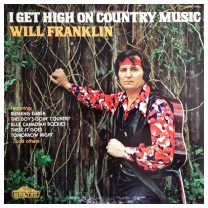 Will Franklin "I Get High On Country Music" (Seatac Records, 1974) (LP)
Will Franklin "I Get High On Country Music" (Seatac Records, 1974) (LP)
(Produced by Will Franklin)
I really wanted to like this one -- I mean, I get high on country music, too, and I loves me a good novelty song -- but the fact of the matter is, this is pretty rough going, musically speaking. Well, vocally, really... Mr. Franklin booked a high-class Nashville studio band for these sessions, including Kenneth Buttrey, Jimmy Capps, Weldon Myrick, Jerry Shook, Pete Wade and others, but I found these tracks a little hard to listen to. I think the songs themselves might be kinda good, but I'm not entirely sure. I have to go back and give this one another fair shake sometime. Not 100% positive where he was from, either -- some sources say Kentucky, but the label name (SeaTac) suggests the Pacific Northwest. Anyway, despite best intentions and plenty of twang, this one's a bit iffy.
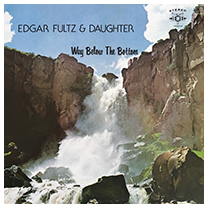 Edgar Fultz & Daughter "Way Below The Bottom" (Jewel Records, 1981-?) (LP)
Edgar Fultz & Daughter "Way Below The Bottom" (Jewel Records, 1981-?) (LP)
(Produced by J. D. Jarvis & Rusty York)
A very pleasant, very rootsy country gospel album, featuring Newport, Kentucky's Edgar Fultz and his daughter Patricia Warren, in a series of original songs that resonate with authenticity and emotion. Fultz brings a robust, truly rural sound to this work -- plenty of twang and a sense that when he's singing about redemption and sin, maybe this is a guy who is really speaking from the heart and working through some of his own, personal life choices. Indeed, Fultz had a hard life, complete with run-ins with the law and a long prison term, and talks plainly in the liner notes about how he found religion and was born again in 1979 after trying therapy and AA, and he also mentions running his own business as a tree cutter and stump removal man. The Ohio-based backing band includes Junior Bennett on fiddle, Chubby Howard on steel, and producer J. D. Jarvis on rhythm guitar -- Jarvis also contributes liner notes praising Fultz and thanking him for recording his patriotic song, "Thank God For Old Glory." On the opening track I was immediately reminded of Ricky Skaggs -- hearing that same level of sincerity and devotion to traditional music -- though as the album spun forward, it sounded progressively earthier and raw. A nice record if you like the genre, and also appreciate records that don't sound all smooth and super-slick.
Edgar Fultz & Patricia Warren "I Ain't Lookin' Back" (Nation Wide Records, 19--?) (LP)
Another all-gospel father-daughter album, with one song, "I Ain't Lookin' Back," that also appeared on the album above. I'm not sure which record came first, although I think the Jewel LP was not his first album. This also includes a Christmas song called "A Message to Santa."
Edgar Fultz & Patricia Warren "It's Too Late Now" (Jewel Records, 19--?) (LP)
(Produced by J. D. Jarvis & Rusty York)
Highlights of album include Fultz originals such as "The Devil's Garbage Can" and "God Is Watching Through A Teardrop," with backing by a band once again anchored by fiddler Junior Bennett and Kenny Holycross on steel guitar.
Edgar Fultz & Patricia Warren "Mother's Old Washboard" (Jewel Records, 19--?) (LP)
(Produced by J. D. Jarvis)
Marshall Gibson "I Can't Forget" (Lincoln Jamboree Records, 19--) (LP)
(Produced by Wayne Sexton)
A singer and piano player, Marshall Gibson was a member of one of the later editions of Joel Ray Sprowls' country revue, the Lincoln Jamboree, located in Hodgenville, Kentucky. There's no info about him online, and no date on the disc or the album art, though it looks like it might have been early/mid-1980s(?). The repertoire is mostly classic country covers, though Marshall wrote the title track, "I Can't Forget." He's joined here by Carlton Noel on steel, Charles Durham (drums), Jack Lewis (bass) and Ronnie Benningfield (backup vocals), as well as Darrell Tubb on lead guitar. (Tubb is also a dobro and steel player who worked in numerous regional country and bluegrass bands over the years, right up into the 2010s, when he helped anchor the house band for the Corydon Live Jamboree, in Corydon, Indiana.
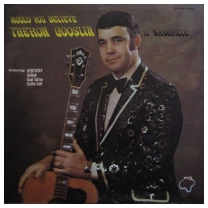 Theron Gooslin "Would You Believe" (Viper Records, 1971-?) (LP)
Theron Gooslin "Would You Believe" (Viper Records, 1971-?) (LP)
(Produced by Darrell Glenn & Thomas Wayne)
A Kentucky native, singer Theron Gooslin had a regular gig during the 1970s, playing at the Continental Inn in Lexington. On this album he hammers hard on regionally-themed tunes like "Coal Tattoo" and "Kentucky," along with a bunch of country covers -- "Cattle Call," "Green Green Grass Of Home, "Six Days On The Road," "Is Anybody Going To San Antone" and "Ring Of Fire." No info on when this one came out, though it looks early '70s -- a single on Viper is dated 1971, so that's our best guess about the LP.
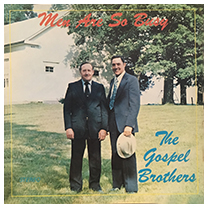 The Gospel Brothers "Men Are So Busy" (MMP/Mountain Music Productions, 1973) (LP)
The Gospel Brothers "Men Are So Busy" (MMP/Mountain Music Productions, 1973) (LP)
(Produced by W. A. Masden)
Awesome, super-twangy country gospel from the duo of Willard Crase and J. C. Reliford, two resolutely old-fashioned country boys from Kentucky. This is very much in the style of the Louvin Brothers, though perhaps with a more rough-cut edge. Awesome, if you ask me.
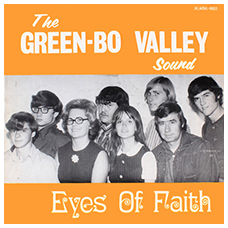 The Green-Bo Valley Sound "Eyes Of Faith" (K-Ark Records, 197--?) (LP)
The Green-Bo Valley Sound "Eyes Of Faith" (K-Ark Records, 197--?) (LP)
(Produced by John Capps)
Lead singer and songwriter Joe Hicks was a self-taught five-string banjo player from Kentucky whose idiosyncratic style, by his own admission, didn't fit in with the local mountain music scene. He played in several in several small groups before landing a gig in the house band of the Green-Bo Valley Jamboree, a short-lived "opry" venue that started in the summer of 1968, housed in an old barn in rural Boyd Country, but had folded by the time these two albums were recorded in the early 1970s. Hicks memorialized the show by naming his own band after it, and seems to have cut two albums worth of material at the same time during a trip to Nashville. This first album unfortunately doesn't list all the musicians, notably omitting two gals pictured on the cover, one of whom may have been his wife(?) and another gal who looks like she was in her teens or early twenties. Mr. Hicks seems to have been the oldest member of the band, and one of the kids in the picture is probably drummer Mike Hicks (his son?) who played on the other LP. (The folks pictured on this album look much younger than the other, though the catalog numbers are quite close; I think this one is using an older picture, possibly from their jamboree days...) The songs are all originals written by Mr. Hicks, and most had an overt spiritual theme ("Eyes Of Faith," "Railway Station In Life," "Trinity," etc.) though others ("Everybody's Talking But Nobody's Listening," "If You Can't Beat 'Em, Join 'Em,") "Slick Pickin' Chicken") stray from a strictly gospel path. Mr. Hicks seems like he was a real character: other than the albums themselves, though, there's not a lot of information out there about him or the band. Alas, no dates on these discs, though some sources place them as 1970 releases.
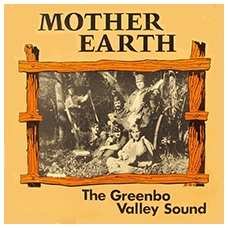 The Greenbo Valley Sound "Mother Earth" (K-Ark Records, 197--?) (LP)
The Greenbo Valley Sound "Mother Earth" (K-Ark Records, 197--?) (LP)
This second Greenbo album seems to have been recorded contemporaneously with the first, though this one has more complete liner notes which give us the name of the folks in the band. In addition to Joe Hicks on lead vocals and banjo, there's Mike Hicks on drums (I assume he's Joe's son?) along with saxophonist Byron Laird, bass player Wayne Lafferty and Ricky Yates on lead guitar. Once again, all the songs are originals, with nine songs by Joe Hicks, two by Laird, and one written by Lafferty. Along with a reprise of the song "Mother Earth" (which was also on the first LP) this includes tunes such as "Coffee Slurper," "Confusion," and "Plant A Tree Of Hope" -- not your usual backwoods fare, for sure!
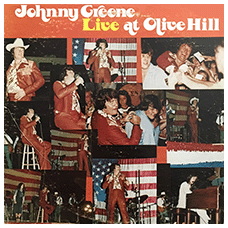 Johnny Greene "Live At Olive Hill" (Major Recording Company, 1977) (LP)
Johnny Greene "Live At Olive Hill" (Major Recording Company, 1977) (LP)
(Produced by John Major, Gary Major & Joey Davis)
A souvenir album recorded at a Fourth Of July homecoming concert sponsored by the chamber of commerce in Olive Hill, Kentucky, a beensy little place just a few miles east of Upper Tygart. This includes live versions of hits such as "After The Lovin'," "Heard It In A Love Song," and "Margaritaville," as well as outlaw-adjacent material like "Good Hearted Woman" and "Luckenbach, Texas," and even an Elvis Presley medley, all capped off with yet another version of Mickey Newberry's insufferable "American Trilogy." (I still don't understand how Newberry was able to claim copyright over a medley of three old songs, but maybe it's none of my business...) Pretty sure this young fella from Sandy Hook, Kentucky was not the same guy as Ohio's deejay-bandleader Johnnie Greene (above) though the confusion is understandable. The live band included Johnny Greene on vocals, Mike Bennett (drums), David Goode (bass), Jon Hoppe (keyboards), Bobby Ray Petts (guitar) and additional vocals by a gal named Donna Mickey. Dunno how long Mr. Greene led his band, but judging from mu copy's autographs dated January, 1978, he was selling the album at gigs for a while in the late 'Seventies.
Tommy Gregory "100% Tommy" (TGA Records, 1982) (LP)
(Produced by Herb Clinard)
Aspiring songwriter Tommy Gregory was born 1943 in hyper-rural Ely Hollow, Kentucky, which is basically a cluster of houses on a remote country road located between the tiny towns of Keenox and Flat Lick, or -- by different reckoning, about twenty miles due west of Harlan. As a young man he moved to Louisville, and well... maybe I should just let him tell his own story in their liner notes from this album (credited to Pee Wee King) which are probably emblematic of many of the artists profiled on this website: "...Tommy migrated to Louisville, Ky., and in 1962 worked as an auto mechanic, along with numerous other occupations until 1968, when he was employed by a trucking company also of Louisville. Tommy began writing songs in 1973, and tried with very little success to sell his material to record and publishing companys; his struggle with these record companys has continued for nine years now, and with his own southern drive, and ambitions in music, inspired him, in this year, 1982, to form his own publishing and record company. He writes and performs his own songs, thats why this album is called '100% TOMMY'." Presumably many of the same songs he spent a decade trying to sell in Nashville are included on this album: "Mr. Lawman," "Fancy Cars And Late Night Bars," "Give Me Your Broken Heart One Piece At A Time" and "X-Rated Chevy" are among the many intriguing song titles, though since Mr. Gregory also thanks Pee Wee King's pal, Redd Stewart, "for his information on bridging a song," there's a good chance that they may indeed have been rough-cut gems all those years he was banging his head against the music industry walls. It's not clear where this was recorded, though there's a label address in New Albany, Indiana... This album may have been more of a challenge to record than others, as the musicians include several different sets of bassists (Danny Berry, Bill Kindsbury, Keven Troutman); drummers (Jeff Chanley, Ronnie Cooke, Tommy Richards), and guitarists (Tommy Alexander, Wayne Johnson, Rex Wiseman) along with Tommy Gregory on rhythm guitar, steel player Tommy White, Herb Clinard on fiddle and Redd Stewart credited as helping with the arrangements. But, much to his credit, Tommy Gregory did get it done, and left his musical legacy for all to enjoy... As far as I know, though, this was his only album.
 Stan Gunn "Two Sides Of Stan Gunn" (Sugar Hill Records, 19--?) (LP)
Stan Gunn "Two Sides Of Stan Gunn" (Sugar Hill Records, 19--?) (LP)
Stan Gunn was a former rockabilly singer, perhaps best known for his novelty classic, "Baby Sitter Boogie," which he recorded with his brothers Elmo and Leon. Like many rockabilly rebels, Gunn later went country, working the Midwestern country lounge circuit, from Iowa and South Dakota over to the Rocky Mountains and down to Kentucky. He recorded several albums, often emphasizing the theme of his versatility, i.e. his ability to sing both "country" and "pop." Gunn was apparently born in Kentucky, though he moved around a lot, and made Iowa his base of operations for several years, around the time he recorded these records.
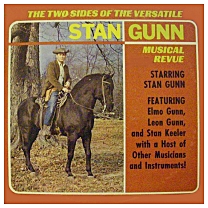 Stan Gunn "Two Sides Of The Stan Gunn Musical Revue" (Y Records, 19--?) (LP)
Stan Gunn "Two Sides Of The Stan Gunn Musical Revue" (Y Records, 19--?) (LP)
This album also includes contributions from Elmo Gunn, Leon Gunn and Stan Keeler...
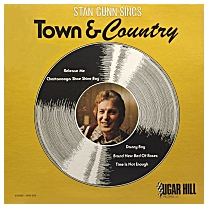 Stan Gunn "...Sings Town And Country" (Sugar Hill Records, 1974) (LP)
Stan Gunn "...Sings Town And Country" (Sugar Hill Records, 1974) (LP)
Recording for a label in Springfield, Illinois, crooner Stan Gunn once again "shows versatility" on a set that includes country standards such as "Release Me" and "I'm So Lonesome I Could Cry" with a few "town" pop songs such as "Danny Boy" and "Spanish Eyes," as well as contemporary hits like "Sunday Morning Coming Down." The defining quality of this album seems to be its connection to songwriter Alex Zanetis, a Nashville pro who probably had a few new tunes to promote at the time, leading me to believe that this disc was a publisher's showcase album.
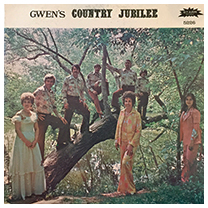 Gwen's Country Jubilee "Gwen's Country Jubilee" (Starr Records, 1973-?) (LP)
Gwen's Country Jubilee "Gwen's Country Jubilee" (Starr Records, 1973-?) (LP)
(Produced by Jack Casey & Marvin Jones)
Although her group's "jubilee" band name made it sound like Gwen Turner was running her own mini-opry, this was actually an informal, self-contained group that made live appearances at the Mountaineer Opry House in Milton, West Virginia, just on the state line about fifty miles from Cincinnati. The Mountaineer Opry opened in 1972, and Turner's band recorded this album the following year. The liner notes say that Mrs. Turner "gave up a career" to start this band, apparently corralling several friends and acquaintances to start a band, ranging from thirteen-year old singer Sandy Powers to guitarist and aspiring songwriter Bill Wurts, as well as Sue Conley (vocals), Jim Lyons (rhythm guitar), Larry Lyons (bass), and Jim Reed (drums), and Jerry Van Hoose on steel guitar. Around the same time Gwen and her husband "Doc" Turner started something called the Appalachian Country Jubilee, Inc., in their home state of Kentucky, and may have been hoping to create a local venue of their own. The liner notes say that Gwen Turner mostly sang harmony and was reluctant to sing lead; as far as I can tell she didn't have an earlier career as a solo performer, and hadn't recorded anything before this album. Steel player Jerry Van Hoose recorded an album called Steel Memories," and seems to have moved down to Florida. Other than that, this record is a bit of a mystery.
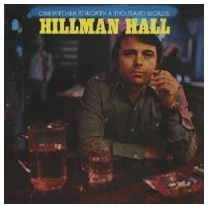 Hillman Hall "One Pitcher Is Worth A Thousand Words" (Warner Brothers, 1975) (LP)
Hillman Hall "One Pitcher Is Worth A Thousand Words" (Warner Brothers, 1975) (LP)
(Produced by Marijohn Wilkin)
This is the lone album by Tom T. Hall's younger brother, Hillman Hall, a modestly talented but entirely likeable country singer as well as a fairly successful songwriter, mainly known for the early '70s hit, "Pass Me By," which was a big hit for Johnny Rodriguez. This album is packed with original material, including the misery-laden title track, and novelty numbers like "Celluloid Cowboy," "You Can't Fool A Country Music Fan," "Fair To Middlin' Lower Middle Class Plain Hard Working Man" and "The Good News She Loves Me (The Bad News She's Gone)," as well as his own version of "Pass Me By." The arrangements are slick but rock-solid studio stuff, earthy though understated mid-1970s hard-country, with plenty of fiddle, dobro and pedal steel... This one's a real hidden gem from an artist who (obviously) lived in his brother's shadow, but did good -- real good -- when he got his chance.
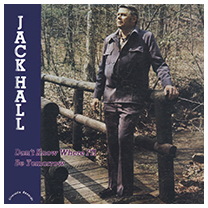 Jack Hall "Don't Know Where I'll Be Tomorrow" (Riverside Records, 1978) (LP)
Jack Hall "Don't Know Where I'll Be Tomorrow" (Riverside Records, 1978) (LP)
(Produced by Hillman Hall & Stan Beaver)
Well, I'll be darned. Turns out Hillman Hall and Tom T. Hall had a third brother who also wrote and sang songs, although it's quite possible this was his only album(?) Jack is backed by his siblings, with Hillman on drums and Tom playing lead guitar, Ray Edwards playing steel (and a bunch of other instruments!) and Bill Wence on piano, along with a bunch of other folks. The disc includes four originals written by Jack Hall, one each from Hillman and Tom T., as well as a Hank Williams cover, and one by Jimmie Rodgers, and last of all, the spooky bluegrass classic, "Bringing Mary Home" from John Duffy and The Country Gentlemen.
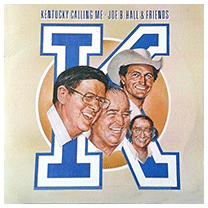 Joe B. Hall "Kentucky Calling Me" (Classic Records, 1981) (LP)
Joe B. Hall "Kentucky Calling Me" (Classic Records, 1981) (LP)
(Produced by Milton Blackford & Johnny Meyers)
A slightly nutty vanity album from Kentucky-born Joe B. Hall, a guy best known as the former head coach of the University of Kentucky basketball program, from 1972-85. He was a very successful coach and, as it turns out, a decent country singer, especially with backing from some usual-suspects Nashville pros. He was also generous with the spotlight, inviting former Kentucky governor A. B. "Happy" Chandler to sing on a solo rendition of "Old Kentucky Home" as well as his fellow coach, Marquette University's Al McGuire to do a duet version of the Kenny Rogers hit, "The Gambler," and sports announcer Cawood Ledford, who chimes in during "On The Road Again." Mr. Hall juggled a few of the lyrics around to include basketball references (why not?) and also pays homage to his home state... As far as I know, this was his only album, though he did later go into hosting sports radio.
Tom T. Hall - see artist discography
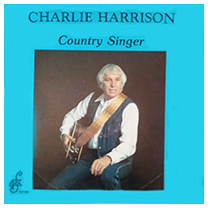 Charlie Harrison "Country Singer" (Ark Record Company, 1985-?) (LP)
Charlie Harrison "Country Singer" (Ark Record Company, 1985-?) (LP)
(Produced by Everett Faulkner & Frank Green)
All-original material by a guy from London, Kentucky. Most songs were written by Charlie Harrison, with one, "Dark Shadows (Following Me)," credited to Howard Henson. Henson seems to have been a pal of Harrison; they shared the same publishing company and Harrison also recorded his song "You Cheated, You Lied," on a single. This album was recorded at the Pollyfox Grand Studios in Nashville; sadly there's no info on the backing musicians.
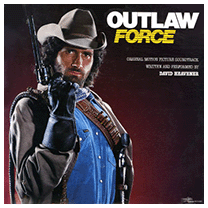 David Heavener "Outlaw Force" (Soundtrack) (Century VII Records, 1988) (LP)
David Heavener "Outlaw Force" (Soundtrack) (Century VII Records, 1988) (LP)
(Produced by David Heavener)
Louisville-based songwriter-producer David Heavener was a real character, an aspiring songwriter who headed to Nashville in the early 'Seventies, where he had some success as a composer, mainly working as a staff musician for the Hee-Haw TV show, although later he returned to Kentucky and tried to make it as a private-press record producer. In the 1980s, Heavener got into film production, and became known for making super-low-rent, quick-and-dirty genre knockoffs with titles like Jurassic Women, Kill Crazy and Lethal Ninja, as well as 1988's Outlaw Force, which boasts this album as its soundtrack. As far as I know, this was his only full album, although he also released a string of singles under his own name, as well as some song-poem sets featuring Kentucky locals.
 Hoot Hester "Don't Give A Hoot" (API/Atteiram Records, 1985-?) (LP)
Hoot Hester "Don't Give A Hoot" (API/Atteiram Records, 1985-?) (LP)
(Produced by Sonny Deaton & Hoot Hester)
Primarily known as a fiddler, multi-instrumentalist Hubert "Hoot" Hester (1951-2016) started out as a Kentucky bluegrasser, but steadily worked his way into the elite ranks of Nashville studio musicians, starting back in the early 1970s. He worked in touring groups for several different stars, though perhaps his most high-profile gig was in the house band for the Nashville Now TV show, and later as cast member at the Grand Ole Opry. This album features Hoot Hester on fiddle, guitar and mandolin, joined by several other high-profile studio pros -- Ben Brogdon (bass and guitar), Paul Franklin (steel), Greg Galbraith (lead guitar), Randy Hauser (drums), and John Propst on piano. (Hester and Brogdon had previously been in the Rio Grande Band together, and I suspect Hester had done a lot of work with the others as well...) On the back cover this album bears the stamp of "Faron Young Enterprises," suggesting that at the time Hester was in Young's band, The Deputies, although no mention of FYE on the subsequent album (below) which came out at roughly the same time. In the late 1990s, Hester co-founded the revered country jam band, The Time Jumpers, among many career highlights
 Hoot Hester "On The Swingin Side" (API/Atteiram Records, 1985-?) (LP)
Hoot Hester "On The Swingin Side" (API/Atteiram Records, 1985-?) (LP)
(Produced by Doyle Grisham & Hoot Hester)
A heavy tilt towards western swing on this one, and a bit less bluegrass... Several of the studio pickers remain the same (Brogdon, Franklin, Galbraith, Probst) but Hester seems to have taken advantage of the opportunities at his fingertips and also brought in other all-stars such as Phil Baugh, Doug Jernigan, Jerry Kroon, Hargus Robbins, and others... Groovy song selection, including some vocal numbers such as "Deep Water," "Honky Tonks, Good Ole Gals, And Hillbilly Bands," and "King Of Western Swing," giving a hint of the Time Jumpers vibe coming in later years.
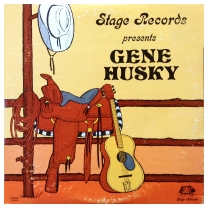 Gene Husky "Stage Records Presents..." (Stage Records, 1981) (LP)
Gene Husky "Stage Records Presents..." (Stage Records, 1981) (LP)
A good-natured amateur from Owensboro, Kentucky, singing with feeling on a simply-produced, semi-clunky, modest little album. The centerpieces are several covers of songs from Waylon Jennings and Jessi Colter, so there's a mild outlaw vibe. Mostly, it's just some guys getting together to pick and sing a few favorite tunes -- his backing band included guitarist Jack Schoolcraft, bassist Mony Latham, drummer Charlie James and fiddler Herman Alvy, who all chipped in on vocals as well. This won't make the earth open up underneath you, but it's a nice, honest, authentic album. I'm pretty sure Gene's no relation to Ferlin, though.
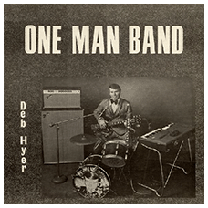 Deb Hyer "One Man Band" (Lemco Records, 1973) (LP)
Deb Hyer "One Man Band" (Lemco Records, 1973) (LP)
A novelty act, but pretty solid musically. Not a lot of biographical info out there about Mr. Deb Hyer, an energetic showman from Flemingsburg, Kentucky who says he started performing as a one-man band because the group he had been in broke up. Hyer played drums, guitar, organ and saxophone and seems to have recorded exclusively for the Lexington-based Lemco label, cutting at least two LPs as well as a single or two that contained material not heard on the albums. On his first go-round, he was a little more in a rock/pop mode, playing late 'Sixties/early 'Seventies hits such as "Bridge Over Troubled Water" and "Joy To The World," as well as more country-adjacent stuff like "Baby Don't Get Hooked On Me," "Help Me Make It Through The Night" and (of course) that old standby, "Proud Mary." A few tracks may be his own originals, like the title track, "One Man Band," but song credits are not to be found. Deb Hyer played local weddings, parties and nightclubs -- not sure how long he kept at it, but he was well-regarded among the locals.
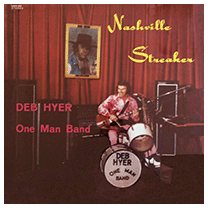 Deb Hyer "Nashville Streaker" (Lemco Records, 1976-?) (LP)
Deb Hyer "Nashville Streaker" (Lemco Records, 1976-?) (LP)
(Produced by Cecil Jones)
by his second album, Deb Hyer had taken a much more distinctly turn towards country material, playing "By The Time I Get To Phoenix," Merle Haggard's "Today I Started Loving You Again," the Freddy Fender hit, "Before The Next Teardrop Falls," and instrumental oldies like "Sugar Foot Rag" and "Wildwood Flower." He also covers not one, but two, great tunes off the first Amazing Rhythm Aces album, "Amazing Grace Used To Be Her Favorite Song" and their big hit, "Third Rate Romance." Rollicking, good-natured, and raggedy in just the right way. Anyone know what happened to this feller?
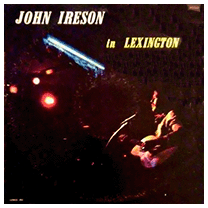 John Ireson "In Lexington" (Lemco Records, 1973) (LP)
John Ireson "In Lexington" (Lemco Records, 1973) (LP)
(Produced by Cecil Jones & Pat Scaggs)
A country guy with an unusual cultural footprint... John Balfour Ireson (1937-2016) was born in Jefferson, North Carolina and worked as a jingle writer and film composer, including a long stint in Europe where he worked on various Italian "spaghetti westerns." He later settled down in Kentucky and got into his country roots, recording a few singles as well as this groovy LP which has some fine examples of rural white funk-twang, in the style of Tony Joe White or Larry Jon Wilson. Tons of original material with unusual arrangements and backing by drummer Marlin Hargis, Jimmy Pennington (guitar), Danny Williams (bass), Fred Wooten (steel guitar), string arrangements by the Lemay Quartet, and background vocals by Karen Elliott and Kay Roebuck. All the songs are originals co-written by Ireson and his brother Cecil, with the lone exception being a version of Jerome Kern's "Old Man River." A strong candidate for reissue, if you ask me... perhaps along with his 1968 Italian album cut under the name "The Wilder Brothers"?
 Lois Jane (Neal) "One Of God's Sheep" (Lois Jane Neal Records, 1966) (LP)
Lois Jane (Neal) "One Of God's Sheep" (Lois Jane Neal Records, 1966) (LP)
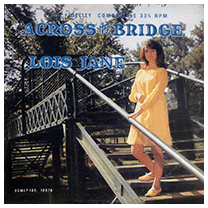 Lois Jane "Across The Bridge" (Big Gospel Records, 1968-?) (LP)
Lois Jane "Across The Bridge" (Big Gospel Records, 1968-?) (LP)
(Produced by Wally Fowler & Rick Shea)
A teenage country gospel prodigy from Kentucky, Lois Jane Neal sounded a little like her fellow Kentuckian Loretta Lynn, uptempo and very rural, with legitimately twangy backing. Still in high school when this late-'Sixties album came out, she was a featured performer on Wally Fowler's syndicated TV show. Although this wasn't her first LP, she had been recording singles for several years, at least back as far as 1962, when she would have been about eleven or twelve years old. She built up a loyal following in the regional gospel scene in the 1970's and '80s, and continued her musical ministry online in years to come.
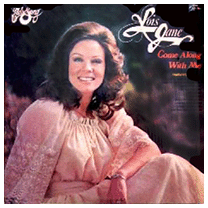 Lois Jane "Come Along With Me" (Praise Song Records, 197--?) (LP)
Lois Jane "Come Along With Me" (Praise Song Records, 197--?) (LP)
This mid-Seventies album had a note of pop-country twang to it, a nice post-countrypolitan sound. Pretty darn Jesus-y and PTL Club, but with a fairly legit country sound.
 Lois Jane "Lois Jane" (QCA Records, 1979) (LP)
Lois Jane "Lois Jane" (QCA Records, 1979) (LP)
(Produced by Vic Clay, Charles Novell & Chuck Seitz)
 Connie Johnson "Love Is What You Make It" (Century VII Records, 1980-?) (LP)
Connie Johnson "Love Is What You Make It" (Century VII Records, 1980-?) (LP)
(Produced by David Heavener & Bill Vorndick)
Recorded in Nashville, this would-be Top 40 country-pop outing seems to have mostly been a demo set for executive producer David Heavener, who is credited as composer of six out of ten songs. He doesn't seem to have been in Ms. Johnson's band though two other tracks, "Bits And Pieces" and "Whisper Goodbye," were co-written by Rich Dettman and Tom Hendrickson, who were. No info about Connie Johnson, alas, though she may have been from a small town in northern Kentucky, near the Indiana border: David Heavener also produced some records for radio station WAMZ, Louisville, and she may have been in the orbit of the Lemon Tree Lounge, where he performed. This seems to have been her only album.
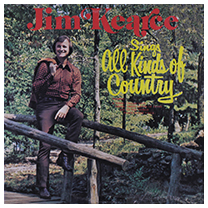 Jim Kearce "Sings All Kinds Of Country" (K & L Records, 19--?) (LP)
Jim Kearce "Sings All Kinds Of Country" (K & L Records, 19--?) (LP)
(Produced by Charlie Bragg & R. Tucker)
A secular album by gospel singer Jim Kearce, who came to country music from a religious background... From 1971-78 he headed the Sir James Singers, a vocal group that toured widely but was based in Bowling Green, Kentucky, where Kearce also had his own local TV program, a religiously-themed variety show... He also seems to have worked in Los Angeles a bit, singing at joints like the Ye Little Club, in Beverly Hills, and appearing on the Jerry Lewis telethon. The liner notes are minimal, though the backing band seem to have been the usual Nashville pros, since on the song credits, several arrangments are credited to studio musicians such as Bill Walker, Hank Strzelecki, et. al. (In 1976, Kearce also signed with Strzelecki's short-lived Omni label, so they may have had a strong professional relationship...) Kearce recorded several other albums, mostly gospel material, and later retired to Florida.
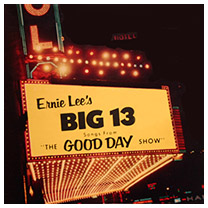 Ernie Lee "Ernie Lee's Big Thirteen" (Century Custom Recording Service, 1965-?) (LP)
Ernie Lee "Ernie Lee's Big Thirteen" (Century Custom Recording Service, 1965-?) (LP)
(Produced by Charles Fuller)
A veteran of the 1940s and post-war 1950's hillbilly scene, Kentucky-born Ernie Lee (1916-1991) recorded prolifically for major labels such as Mercury, RCA Victor and MGM singing jaunty, uptempo country tunes in the style of early Red Foley. He performed on or hosted a variety of live venues and radio shows, and at the time of this album was star of The Good Day Show on Tampa, Florida TV station WTVT, a program he started in 1958. Although he cut a bunch of singles over the years, this was apparently his only full LP. Lee is joined by Good Day cast members Herb and Kay Adams and guitar pickers J.D. Renney and Dewey Tew. (The Adamses were a country duo from Ohio who worked with Ernie Lee in several different gigs, and Mrs. Adams was a different gal from the Bakersfield honkytonk gal/ of the same name.) Lee had moved to Tampa for the climate, and stayed there for nearly four decades, hosting the The Good Day Show right up until he passed away in 1991. (Thanks to www.big13.com for providing a wealth of biographical info on Lee and his career.)
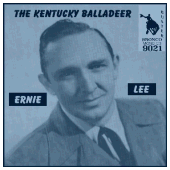 Ernie Lee "The Kentucky Balladeer" (Binge Disc/Bronco Buster, 2000)
Ernie Lee "The Kentucky Balladeer" (Binge Disc/Bronco Buster, 2000)
Classic uptempo postwar twang, solidly in the Tennessee Ernie Ford/Red Foley tradition of bouncy, jovial bullfrog vocals. These archival recording capture Ernie Lee at his peak, fun stuff skimmed from the Mercury and MGM catalogs -- well worth checking out!
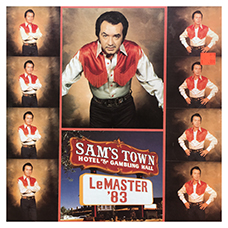 Gary LeMaster "LeMaster '83" (Cary Records, 1983) (LP)
Gary LeMaster "LeMaster '83" (Cary Records, 1983) (LP)
(Produced by Gary LeMaster & Michael Hufford)
An earnest live album from a (then) fairly obscure musician... Born in Ashland, Kentucky, Gary LeMaster (1942-2012) apparently was in some rock bands as a kid, but moved into country when he got older. In the early '80s he had a steady gig at a joint in Las Vegas called Sam's Town Hotel & Gambling Hall, which is pictured on the cover, and he's had a gloriously Vegas-y look to match the venue. Not long after this, though, LeMaster shifted into a more down-home mode, joining a late edition of the fabled western band, The Sons Of The Pioneers, replacing Roy Lanham as the group's guitar player. He was in the group for over two decades, from roughly 1986 up until his health failed in 2012; LeMaster's father-in-law, multi-instrumentalist Sunny Spencer, was a member of the Sons for much of the same period, from 1984-2005. Spencer's daughter Valerie married Gary LeMaster and was in his band at the time of the Vegas gig and sings on this album. The rest of the musicians include steel guitar player Michael Huffman, Jeffrey Popp (bass and keyboards), David Poe (saxophone) and Doug Twyman on drums. The songs look like originals, including the closing number, "Ballad Of Sam Boyd," written in homage to the guy that owned the bar. Although he toured with the Sons Of The Pioneers, starting in 1986, LeMaster made his home in Branson, Missouri, and passed away there in 2012.
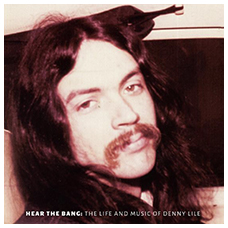 Denny Lile "Denny Lile" (Bridges Records, 1972) (LP)
Denny Lile "Denny Lile" (Bridges Records, 1972) (LP)
(Produced by Wayne Veach & Turley Richards)
A solid set of hippie twang from a Louisville, Kentucky country-rock auteur whose inborn talent could have taken him nationwide, but whose path led elsewhere. This is a remarkable though little-known album, an actual indie-twang "gem" which deftly reveals a remarkably well-formed young talent, with an arresting, evocative sound, right on the opening track, "Hear The Bang." Lile's spooky vocals and striking arrangements merge into a singular presence, one of those oddly charismatic, somewhat eerie musical moments, like when you first heard Nick Drake, or one of those other "touched by grace" hippie-era eclectics. Not that I'm saying Lile is in that same mystic-folkie mode -- indeed, he quickly jumps into a more conventional acid-country mode, bringing to mind early Jonathan Edwards, or even the Youngbloods or Byrds. Lots of stoned-guy romantic musings, interlaced with oblique philosophizing, with often kooky, half-kitsch countrybilly accompaniment. On a few tunes (not all!) there's that kind of manic acoustic bounciness, the same untamed, clunky-but-charming, outsiders-looking-in, longhairs-going-country sound you'd hear on Dead albums and elsewhere: amorphous sheets of drifting pedal steel tones; cheerful, note-happy dobro accompaniment; a distinct lack of finesse in the phrasing, perhaps, but kind of a hoot anyway. There's also a bit of oddly textured, melancholy folk-a-delic meanderings, bringing to mind Tom Rush or Tim Hardin... A lot to chew on here; it's a very interesting record. And if you want to get the lowdown on Denny Lile's career (whatever happened to that guy??) the CD reissue listed below also includes a video disc with a brief documentary on it... Do I don't need to recount the story here, do I? Oh, all right... The short version is that Denny Lile spent his rock'n'roll teens wailing away in a few fabled Louisville-area garage-psych bands, then moved into rural visionary mode with surprising power and vision. This amazing album was his shot at the big time, but for whatever reasons, it tanked or got buried, and while he made a few inroads into Nashville, Lile never really made it in the music business: Waylon Jennings had a top-ten, late '80s hit with one of his songs, "Fallin' Out," but really, that was about it. Not the least of his troubles was a severe drinking problem which led to him blowing a lot of business contacts -- he wound up on the down and outs, dying broke at a very young forty-four, a tragedy made all the more painful when you're struck the immediacy and power of these haunting, plangent tunes. Denny Lile really had something going when he was in his early twenties... For a while he caught lightning in jar, kept it and looked at it a little, then let it go... But he also had the tapedecks rolling when he popped the lid. Lucky us!
Denny Lile "Hear The Bang: The Life And Music Of Denny Lile" (Big Legal Mess Records, 2015) (CD/DVD)
Hey, it includes a buncha bonus tracks -- and a documentary, too!
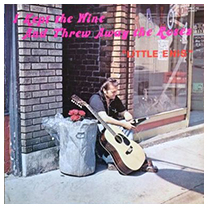 Little Enis "I Kept The Wine And Threw Away The Roses" (Lemco Records, 1974) (LP)
Little Enis "I Kept The Wine And Threw Away The Roses" (Lemco Records, 1974) (LP)
(Produced by Little Enis & Cecil Jones)
A native Kentuckian, Glenn Carlos Toadvine (aka Little Enis, 1935-1976) was a left-handed guitar picker and first-generation 1950s rockabilly artist who was famously profiled in an extensive Playboy article which dubbed him "The Greatest Left-Handed Upside Down Guitar Player." Toadvine grew up in Parksville, Kentucky and became a fixture on the Lexington club scene, although he and his band the Table Toppers also toured nationally for a while, opening for Jerry Lee Lewis. He was also known as a dynamic Elvis Presley imitator, back in the days when Elvis was still alive. The liner notes to this LP grimly note that Little Enis's struggle with alcoholism had almost killed him a few years earlier, though tragically he died of a heart attack less than two years after this came out. A pity, really, since this is a great, truly twangy record, with a fab mid-'Seventies neo-trad sound and a solid country feel. He had kind of a squeaky little voice, but the kid of real-hick squeaky little voice that I really dig. Recommended!
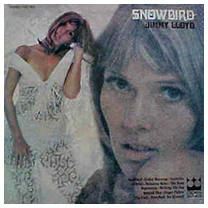 Jimmy Lloyd "Snowbird" (Crown Records, 1970/71-?) (LP)
Jimmy Lloyd "Snowbird" (Crown Records, 1970/71-?) (LP)
A later recording by Kentucky-born hillbilly/rockabilly legend Jimmie Logsdon (1922-2001) recording under the alias he used for his rock recordings, back in the 1950s. This is an instrumental set built around Logsdon's considerable skills as a guitar picker, with backing by an anonymous studio band cobbled together by the Crown label. Mostly it's a lot cheesier than you'd expect compared to his fiery early work, but there's a nice variety of material, some of it kinda surfy or Jimmy Bryant-esque, some of it Chet Atkins-y, and some of it straight up muzak; one track, "Everybody For Himself," has a Muscle Shoals feel. If you're into twangy guitar instrumental albums, this disc's a doozy. Apparently Mr. Logsdon retired from show business in the early 'Seventies, not long after this came out.
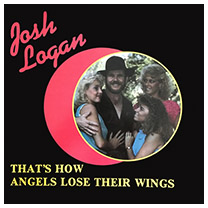 Josh Logan "That's How Angels Lose Their Wings" (Multi-Tempo-Country/MTC Records, 1986-?) (LP)
Josh Logan "That's How Angels Lose Their Wings" (Multi-Tempo-Country/MTC Records, 1986-?) (LP)
(Produced by Jim Prater & Junior Bennett)
Latter-day honkytonk by a neotrad lad from Cartersville, Kentucky who dug the good stuff: Merle Haggard, George Jones, guys like that... This indie outing was his first album, recorded in Nashville and packed with original material, though Logan actually had been at it for years before this, cutting a few indie singles at the start of the decade. The late '80s were when he really hit his stride, signing to Curb Records and scoring a few chart entries that peaked somewhere in the Back Forty, touring and opening for bigger stars while writing material for guys like Tracy Lawrence and Aaron Tippin who would rule the charts in the 'Nineties. This "lost album" is pretty groovy, though unfortunately the backing musicians aren't identified, but one assumes they were Music City pros. After his major label stint, Logan returned to the indie scene, releasing at least one album in the CD era, and apparently gained a following in Europe, as have many twangsters before him.
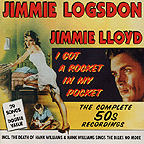 Jimmie Logsdon "I Got A Rocket In My Pocket" (Bear Family Records, 1993)
Jimmie Logsdon "I Got A Rocket In My Pocket" (Bear Family Records, 1993)
A hard-country hillbilly singer who signed to Decca in the early 'Fifties, James Lloyd Logsdon (1922-2001) wound up being a one-hit wonder after he tried bluffing his way into the rock'n'roll market. Recording under the pseudonym "Jimmie Lloyd," he laid down the blistering rockabilly classic, "Rocket In My Pocket," which is one of the most explosive, giddy 'billy hits of the 'Fifties. He also recorded a lot of great hick music, including a tribute to Hank Williams, who helped give him a leg-up in his career. Logsdon was one of those honkytonkers in the early 'Fifties who nakedly imitated Williams, but what he sacrificed in originality he more than made up for with his energy and exuberance. This is a some fine hard-country from a time when the style was really cookin'! Recommended.
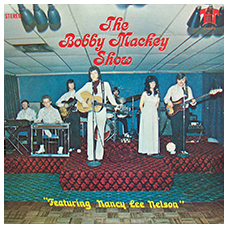 The Bobby Mackey Show "...Featuring Nancy Lee Nelson" (T Records, 1978-?) (LP)
The Bobby Mackey Show "...Featuring Nancy Lee Nelson" (T Records, 1978-?) (LP)
(Produced by Chuck Rogers)
Independent twang from the greater Cincinnati metro region... Kentuckian Bobby Mackey first hit town around 1970 when he became a member of Delbert ("Red") Jenkins' band, the Country Lads. A few years later he set out on his own, and even bought a nightclub in Wilder, Kentucky, just on the other side of the Ohio River. There's no date on this album, but it definitely looks very late 'Seventies, and since Mackey bought the club in '78, I'd guess it was from right around then. Now, about that club... Apparently Bob Mackey's Music World is the subject of a lot of super-lurid stories of vengeful ghosts and gory murders, satanists and suicides, and has been profiled on numerous television shows and such as one of the "most haunted places in America." Make of that what you will; personally, I'm more bothered by the dingy shag carpet and acoustic tiles. Anyway, this album was produced by a guy named Chuck Rogers, who wrote seven of the ten songs; the others are by Tom Ghent, Ken Westberry and there's one by Carol Jones called "To Satisfy The Weakness In A Man," which sounds awful darn groovy. Other than gal singer Nancy Lee Nelson, none of the musicians are identified, which is a pity. Though Mackey later recorded an album in Nashville, I would assume these were all local guys, possibly one of Rusty York's studio groups. Also worth noting: country singer Jack Reno contributes the glowing liner notes; at the time he was working as music director for radio station WUBE, Cincinnati. As far as I can tell, this was Nancy Lee Nelson's only record.
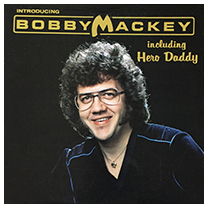 Bobby Mackey "Introducing Bobby Mackey" (QCA Records, 1981) (LP)
Bobby Mackey "Introducing Bobby Mackey" (QCA Records, 1981) (LP)
(Produced by Steve Vining, Pete Drake & Bobby Mackey)
Mackey went to Nashville to "introduce" himself on this album, backed by Music City pros such as Mark Casstevens, Buddy Harmon, Dave Kirby, Hargus Robbins, Hal Rugg, Buddy Spicher, Hank Strzelecki, et al. Even though he left his band back home and was recording mostly cover songs, he brought some original material with him, with a song called "Hero Daddy," which they unsuccessfully tried to plug as a single. (Between albums, however, Mackey did have a brief fling on the charts, with Bill Addison's "Pepsi Man," which hit #57 in the charts in '82... Though it was produced with the same studio, it wasn't included on this album.) Mackey self-released this album, and was still selling copies at his club, nearly four decades later. It's worth noting that Mackey also released a slew of singles on a bunch of labels, and later self-released a bunch of CDs.
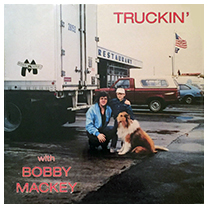 Bobby Mackey "Truckin' With Bobby Mackey" (CRT/Bobby Mackey Records, 1982-?) (LP)
Bobby Mackey "Truckin' With Bobby Mackey" (CRT/Bobby Mackey Records, 1982-?) (LP)
(Produced by Dennis Hensley, Donny Burton & Bobby Mackey)
Breaker, breaker, Smoky, 10-4, good buddy! Taking a break from the whole haunted-nightclub routine, Bobby Mackey hits the road and recorded a bunch of gear-jammin' trucker songs, with backing by what I believe as an all-local Kentucky band, led by Danny Burton on guitar and piano, along with Kenny Bobinger (drums), Ron Griggs (bass), Bob Lotz (harmonica), David Short (lead guitar), Tim Short (drums), and even some guy (Ray Heckman) on saxophone. Let's head for the haunted HoJo's!
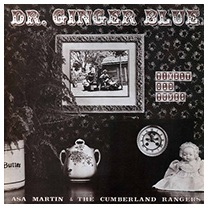 Asa Martin & The Cumberland Rangers "Dr. Ginger Blue: Timely Old Tunes" (Rounder Records, 1974) (LP)
Asa Martin & The Cumberland Rangers "Dr. Ginger Blue: Timely Old Tunes" (Rounder Records, 1974) (LP)
(Produced by Guthrie T. Meade & Mark Wilson)
An old-timey singer from Irving, Kentucky, Asa F. Martin (1900-1979) hosted his own radio program for many years during the Great Depression and recorded numerous influential 78s, though he had been retired from the music business for many years before the folkie-bluegrass crown caught up to him. This album features newer recordings made in the early 'Seventies, with backing by a multi-talented trio -- Earl Barnes, Grady Brazeale and Jim Gaskin -- who trade off on various instruments. Some of these songs will be familiar to country and bluegrass fans, particularly "More Pretty Girls Than One," though for the most part this digs pretty deep into some pretty obscure mountain music.
 Ernest C. Martin "Highway To Heaven, Album No. 1" (A Martin Blue Grass Special, 1962-?) (LP)
Ernest C. Martin "Highway To Heaven, Album No. 1" (A Martin Blue Grass Special, 1962-?) (LP)
(Produced by Ernest C. Martin)
Born in Clay City, Kentucky, Ernest C. Martin (1914-2002) started his career as a secular, old-timey singer, including a stint on WNOX, Knoxville, becoming a regional performer, popular in Kentucky, Ohio and Tennessee. But his first fling at show biz rattled him -- Martin drank heavily and fell into hard times and bad health, as he candidly discussed in later years. When he was just twenty-two years old, Martin devoted himself to a lifelong calling as a Baptist evangelical and recorded primarily gospel music for the next several decades. Mr. Martin, along with his sons Ernie Martin and Vernon Martin, recorded a long string of singles and albums, spanning vinyl, 78s, and 8-track tapes, from the late 1940s to the '80s. He also recorded a number of his radio shows, tapes of which were donated to the Berea College archives. This album, Highway To Heaven, was his first LP, recorded with The Norvel Brothers of Dayton Ohio -- Bob and Ray -- playing bass and "straight guitar," fellow Kentuckian Oral C. Robbins on lead guitar, and Mr. Martin playing banjo. This same configuration also released several singles on the Martin label. This appears to be the first album that his oldest son, Ernest Junior, played on, playing lead guitar on a couple of tracks. The songs appeared on earlier singles (with some dating back to the '40s) though it's not clear how many of the album tracks were re-recordings, or reissues of the originals.
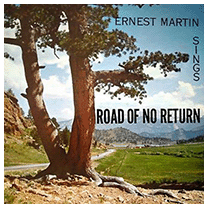 Ernest C. Martin "Road Of No Return" (Martin Records, 1966-?) (LP)
Ernest C. Martin "Road Of No Return" (Martin Records, 1966-?) (LP)
Ernest C. Martin "That Last Inauguration" (Pine Tree Records, 1966-?) (LP)
Ernest C. Martin "What Have You Gained" (Jewel Records, 1973-?) (LP)
(Produced by Rusty York & Reggie Wallace)
In addition to his sons on guitar and bass, this early 'Seventies edition of Martin's band included Dallas Alexander on guitar, Darrel Alexander (drums), and Bruce Andrews (banjo). On the back cover liner notes, Martin discusses his early binge drinking, which he says led to alcohol poisoning on several occasions, as well as to his evangelical calling. Martin had moved to Winchester, Kentucky by the time of this session, and lived there for the rest of his life.
Ernest C. Martin "Too Far Upon My Journey" (Jewel Records, 1973-?) (LP)
Ernest C. Martin "Keep On The Sunny Side" (Jewel Records, 1976) (LP)
(Produced by Rusty York)
According to the liner notes, this was the sixth album of gospel twang by singer and banjoist Ernest C. Martin, at the time living in Burnside, Kentucky. As per usual, he's backed by his sons, Ernie and Vernon. The repertoire is a mix of Carter Family classics, other old-timey tunes, and few Ernest Martin originals... Rusty York wrote the liner notes.
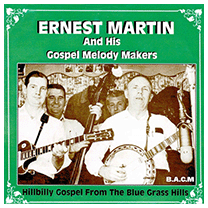 Ernest C. Martin "Hillbilly Gospel From The Bluegrass Hills" (BACM, 2006) (CD-R)
Ernest C. Martin "Hillbilly Gospel From The Bluegrass Hills" (BACM, 2006) (CD-R)
This digital collection gathers a bunch of Martin's earlier recordings, including a slew of tracks with O. C. Robbins and the Norvells. Anyone got an extra copy?
Roger Monhollen "Neighbors Lovin' One Another" (ACA Records, 19--?) (LP)
Recorded in Nashville, this was a mix of covers and original material a "Hank Williams Medley" included, too. Some promising song titles: "Sin's Dark Valley" and "She'll Never See The Sun Shine Again." Methinks Porter Wagoner would be proud. Although Roger Monhollen left some confusing breadcrumbs such as the regionally-themed songs "Alabama Boogie Man" and "Piggott, Arkansas" on his other album (below), he actually seem to have been from Corbin, Kentucky, where the Monhollen family had deep roots. Unfortunately the liner notes don't list the backing musicians, but a signed copy I found included autographs by Jim Ball, Roger Hall, Osie Ownby, and a couple of other guys whose names I couldn't quite make out. (Osie Ownby (1909-2004) and Jim Ball (1916-1991) were old-timers from nearby Gatlinburg, Tennessee who had a bluegrass band called the Mountain Travelers in the 1960s and in the early 'Seventies worked as the house band at Goldrush Junction, along with Russ Jeffers and Russ and Becky Jeffers.) Roger Hall is credited as the composer of one of the album's originals, "Alive And Breathing," while Monhollen wrote others, including some co-composed with Jeff Blalock, who was also owner of a music store in Pigeon Forge, TN. So, a lot of local talent on this one, with the younger Mr. Monhollen drawing on some real-deal mountain music old-timers to bring his music to life.
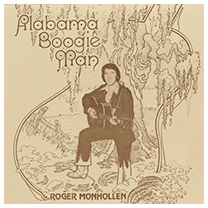 Roger Monhollen "Alabama Boogie Man" (ACA Records, 19--?) (LP)
Roger Monhollen "Alabama Boogie Man" (ACA Records, 19--?) (LP)
An even more obscure album by Mr. Monhollen, which I've only seen mentioned a couple of places, and have yet to hear in full. (Thanks to Mark Bletcher's Appearing In The Motel Lounge blog for posting the title track, which has a rough-hewn, chunky, Jerry Reed/Tony Joe White kinda vibe.) Also included are covers of "Mama Tried," "Amanda," and Gail Davies's "Bucket To The South," along with some possible originals. No info on any of the backing musicians, alas.
 Lattie Moore "I Ain't Broke But I'm Badly Bent" (Demon/West Side Records, 2000)
Lattie Moore "I Ain't Broke But I'm Badly Bent" (Demon/West Side Records, 2000)
AWE. SOME. Although he's best known to rockabilly collectors, Kentucky-born Lattie Moore was a real-deal, hardcore honkytonker. Although he was born in bluegrass territory, Moore moved to Indianapolis in the early 1940s, and established himself as a Midwestern artist, recording for various labels, but mainly for the King label, in nearby Cincinnati. This disc collects twenty-nine songs recorded by Moore for the King and Starday labels, between 1953-1963, and there isn't a track on here that won't make a real country fan drool with delight. It doesn't include his 1952 proto-rockabilly classic, "Juke Joint Johnny," which was recorded before he was signed to King, but the tunes that are on here are all top-notch. For the most part, Moore bypasses novelty material, or at least novelty delivery: whenever possible, he digs as deep into the pathos and heartbreak as he can, eking out the sheer humanity of pain and sorrow. The music's pretty good, too -- these were the same kind of songs George Jones sang early in his career (probably a lot of the same backing musicians as well...) So if you dig Jones classics like "Cup Of Loneliness" and "Hearts In My Dreams," you're gonna love Lattie Moore. Just take my word for it: do whatever you need to, but track this record down!
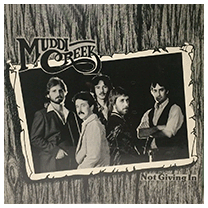 Muddi Creek "Not Giving In" (198--?) (LP)
Muddi Creek "Not Giving In" (198--?) (LP)
(Produced by Ronnie Doyle & Clark Schleicher)
A pretty obscure band from Winchester, Kentucky with ties to the country/pop Top Forty band, Exile. Active from around 1979-85, Muddi Creek included Raymond Anderson Shepherd (lead vocals), Bill Kennon (lead guitar), Donnie Clem (bass), Craig Chapman (banjo and fiddle), Bobby Pearl (drums), Carson Chamberlain (pedal steel), Brian Moore (keyboards). From 1972-73, Bill Kennon was a member of the local, Richmond, Kentucky rock band The Exiles, which shortened its name to Exile in '73, and eventually topped the Pop charts in 1978 with the song "Kiss You All Over," later changing direction to become a chart-topping country band in the early '80s. Exile's driving force, guitarist J. P. Pennington, also performs on this album, playing lead on one track, "Just Came Back."
Josh Noland Guitar Duo "New Horizons" (Empire Records, 1968) (LP)
Fancy guitar work by a guy from Louisville, Kentucky, performing here as a duo with Jim Morris. The set list includes some country stuff -- "By The Time I Get To Phoenix," Ode To Billy Joe" "The Three Bells," a Chet Atkins tune -- but mostly it comes from the 'Sixties pop landscape, along with a couple of Noland's own compositions, "Funky Blues" and "Guitar Rock." Dunno that much about this guy, though he also cut a string of singles on various labels, and one from 1973 on the major-ish label Plantation Records, so it seems possible he may have been doing some studio work at some point as well.
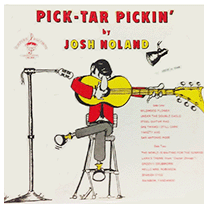 Josh Noland "Pick-Tar Pickin' " (Empire Records, 1970) (LP)
Josh Noland "Pick-Tar Pickin' " (Empire Records, 1970) (LP)
(Produced by Josh Noland, Dave Chiodo & Kevin McManus)
Plenty of country-sourced material on here - "Groovy Grubworm," "San Antonio Rose," "Steel Guitar Rag," "Wildwood Flower" -- though he's still mixing it up with pop hits like "Lara's Theme," etc. On this disc Noland gets sympathetic backing from drummer Paul McCrea, Buford Moore on bass, and rhythm guitarist Bob Watson.
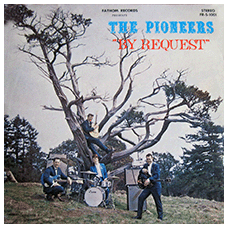 Pioneer Jim "Pioneer Jim's Big Roundup" (Lemco Studios/Pioneer Records, 197--?) (LP)
Pioneer Jim "Pioneer Jim's Big Roundup" (Lemco Studios/Pioneer Records, 197--?) (LP)
(Produced by John Ireson)
A very odd, though not at all unpleasant country comedy set built around an old-timey cowboy character called Pioneer Jim, played by songwriter Jim Williams. A Texas native, he was living in Lexington, Kentucky when this album came out, though he claimed the fictional Dumbell Ranch as his home. There are no details provided on the cover to this souvenir album, but Williams had been working on this particular schtick for quite some time: originally from Amarillo, way back in 1963 he hooked up an old-fashioned wagon train -- pulled by his mules Patience and Tribulation -- and headed off for the 1964 World's Fair, being held in New York City. By 1966, he'd made it all the way up to Ontario, Canada, where a local paper was one of many that helpfully profiled him and his western-revival antics, a self-contained mythology that wove in plenty of old jokes and cornpone humor. Though his goal was to get back to Amarillo in '67, Mr. Williams apparently enjoyed life on the open road, especially the gaping stares of kids and other locals as he drove the wagon through town, and by 1975 seems to have moved to Kentucky, where he donned his buckskin coat and helped out in the city's bicentennial celebrations, sporting full Daniel Boone regalia. This album is a full distillation of the Pioneer Jim routine, with songs about his animal companions, including an Appaloosa horse named Faithful, Friendly the "prairie wolf," and of course, good old Patience and Tribulation, who did all the hard work. This album is a lot better, and a lot weirder, than I expected... The unidentified musicians (probably guys from the Lemco house band) provide solid, cheerful backing, which suits Jim's wheezy Gabby Hayes-ish vocals, an overall sound that's strongly reminiscent of < href "../../countryartists/feller_dick_01.html">'70s songwriter Dick Feller. True, the jokes do drift into Don Bowman-esque territory (not a compliment) but overall Williams manages to pull it off, largely due to his full commitment to the material. He claims songwriter credit on all the songs, though the jokes are obviously a pastiche of a long tradition of hillbilly humor, perhaps most notably in "Son Of A Gun Stew," which is a variation of the old don't-complain-about-the-cooking routine more famously heard on the Utah Phillips tall tale, "Mose Turd Pie." But if you're willing to go corny, this disc is a doozy. Jim Williams also wrote a book about his exploits, called Pioneer Jim's Roundup: Travelin' With Patience And Tribulation, which might do a better job explaining all this than I did.
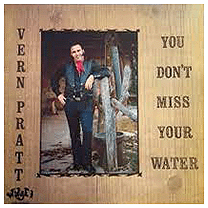 Vern Pratt "You Don't Miss Your Water" (Widget Records, 1976) (LP)
Vern Pratt "You Don't Miss Your Water" (Widget Records, 1976) (LP)
(Produced by Vern Pratt, Jay Wallace & Ron Ballew)
Originally from Cornettsville, Kentucky, picker-singer Vernis Pratt (1936-2012) and his brother Eugene formed a rockabilly band called The Rocking Five, known for their 1960 single, "Go Find Your Love"/"The Wind Told Me So," which earned them a spot in the Rockabilly Hall Of Fame. After the duo split up, Vern Pratt "went country" and moved to Nashville, like many a rocker before him... He had some minor success as a commercial country songwriter, and although he never charted in Billboard, he did gain regional notoriety for the novelty song, "Pearl's Not A Girl, It's A Beer," sung in praise of the San Antonio, Texas beverage known as Pearl Beer (which has long since been swallowed into the corporate maw of the Miller/Pabst monolith...) As far as I know, this album -- packed with original material -- was Pratt's only full-length LP, although he also released several singles, including a few under an assumed name. (Thanks to Shawn Chambers's Lexingtunes music blog, which helped clarify much of the info on Mr. Pratt.)
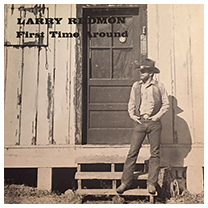 Larry Redmon "First Time Around" (Country Crossings, 1979) (LP)
Larry Redmon "First Time Around" (Country Crossings, 1979) (LP)
A sweet, well-produced set of mellow outlaw honkytonk by Lexington, Kentucky's Larry Redmon. On some songs he presents himself as a blatant Waylon Jennings soundalike (which is fine by me) though in addition to the outlaw growling, there's a fairly wide stylistic range. The album is packed with Redmon originals, including one co-written with Greg Austin, as well as one song by Chuck Pyle, a cover of Guy Clark's "Desperados Waitin' For A Train" and the Latin-tinged pop hit "Come A Little Bit Closer," which had already entered into the country canon in 1977 through a hit duet version recorded by Johnny Duncan and Janie Fricke. All in all, this is a pretty solid record for such an off-the-radar artist. Worth tracking down!
Spider Rich "The Rich Sound Of Twin Guitars" (True Records, 19--?) (LP)
(Produced by Spider Rich & Raymond Rich)
Fancy pickin' and multi-trackin' from longtime Opry guitarist James Q. Rich (1923-2003), who is perhaps best remembered as the co-composer of Boots Randolph's hit instrumental "Yakety Sax," included here as "Yakety Axe." Born in Muhlenberg County, Kentucky, Mr. Rich was kin to the Everly Brothers as well as hillbilly gospel singer Dave Rich, and played in several regional bands while still a teen, before joining the Army and serving in World War Two. After demobilizing, he moved to Nashville where he earned a slot on the Opry stage and became an in-demand picker, touring with Lefty Frizzell and other honkytonk stars. He met Music City legend Chet Atkins in the late 1940s and became a close collaborator with Atkins, who recorded several of Rich's tunes, including his own hit version of "Yakety Axe." This album includes contributions from some family members and fellow Kentuckians he knew in his youth, including Mr. Rich's older brother Raymond and nephew Dave Rich, guitarists Mose Roger and Lindell Russ, and a guy simply called Mac, who played harmonica.
James (Spider) Rich "When They Ring Those Golden Bells" (Rich Tone Records, 197--?) (LP)
A slick, mellow set of gospel instrumentals, strongly influenced by Chet Atkins and his affinity for big band-era pop. Indeed, Spider Rich's pal, Chet Atkins, adds liner notes to the album. Not electrifying, but some pretty classy picking, for sure. Sadly, the backing musicians are not identified.
Jim Richardson & Purebred "Who Are Those Guys?" (Starting Gate Music, 1981) (LP)
(Produced by Vince Emmett)
A fixture on the Lexington, Kentucky bar scene, singer Jim Richardson led the band Purebred from 1977-83, with this album recorded pretty much in the middle of their run. Although they definitely projected a country image and played country-rock twang, there are also a few regrettable doses of '70s-ish AOR and herky-jerky jam-band rock in there, too, with maybe just a hint of disco rhythm as well. The sound mix isn't great, though this album is notable for a wealth of original material... The twangier tunes are respectable, in a New Riders Of The Purple Sage kinda way... Which, by the way, is probably the band they stole their album title from... A little iffy, overall, but worth a spin. (Note: the album's producer Vince Emmett, who plays pedal steel and guitar on some tracks, worked at the independently-owned Lemco music studio, which was a hub for up-and-coming bluegrass talent, and went on to become a well-regarded country/Americana producer and film music composer.)
Chris Robbins "Chris Robbins" (Royal American Records, 1972) (LP)
(Produced by Louis Owens)
A "disenchanted rock performer" from Copper Creek, Kentucky, singer Chris Robbins made the switch to country music in the late 1960s, marked by a guest appearance onstage at the Renfro Valley Barndance in 1966. He soon became a cast regular, notably playing on the weekly "Sunday Morning Gatherin' " and was still working at Renfro Valley when this album came out. Alas, the musicians aren't identified, but we can assume they were drawn from his fellow cast members, or perhaps the Nashville-based Royal American label had its own house musicians. There are several originals on here, including "There's Got To Be A Better Way" and "Travelin' Clothes" by Robbins, and "June" and "Weary Old Man," both credited to "S. D. Cornette," who seems to have been songwriter Swany Cornette, a fellow Kentuckian whose song "Heartache Killer" was recorded by The Browns in '73. Robbins also covers a couple of Kris Kristofferson tunes and closes the album out with "Make The World Go Away," revealing his crooning capabilities. Not a ton of info about Chris Robbins online: anyone know what became of him?
Betty Jean Robinson - see artist profile
Dorothy Rowen "...Sings Your Favorites" (1967-?) (LP)
A lounge act with a healthy dose of country standards such as "King Of The Road," "Mountain Dew," "Make The World Go Away" and "Your Cheating Heart," alongside a few pop tunes like "I Left My Heart In San Francisco" and "Twilight Time." More country than not, I'd say. Not much info about Dorothy J. Roughen (1923-1993) other than that she was playing a gig at the Springs Motel, in Lexington, Kentucky when she cut this album; a few years later she wrote a rah-rah song for the Wildcats football team called "We Believe," which came out as a single in 1970. This one pops up in a lot of different places, but I'll thank The Motel Lounge blog, because I dig their vibe.
Andy Rucker "Andy" (Ancor Records, 197--?) (LP)
(Produced by Louis Redding & Jack Logan)
Rucker was a country singer from Richmond, Kentucky, backed here by Faron Young's band, the Deputies. The songs are mostly covers, with one written by Rucker: "Where Could My Heart Be" and one by album producer Louis Redding, " No Regrets For Loving You." There's also a big medley of Merle Haggard hits, along with covers of "Summertime" "Danny Boy" and "Me And Bobby McGee." Not sure of the exact year this came out -- anyone have more info about this one?
The Russell Brothers "Take Me Home Country Roads" (Jewel Records, 197-?) (LP)
The Russell Brothers "Live At The Big Red Barn" (Jewel Records, 1974) (LP)
The Russell Brothers "Magnify The Lord In Songs" (Jewel Records, 197-?) (LP)
The Russell Brothers "Country Grass" (Jewel Records, 197-?) (LP)
The Russell Brothers "Operation Bluegrass" (Grass Country Records, 19--?) (LP)
The Russell Brothers Boogie Grass Band "On The Run" (Old Homestead Records, 1979) (LP)
(Produced by John W. Morris & Tony Stubbs)
 John Schmid "With Love" (Operation Appreciation, 1977) (LP)
John Schmid "With Love" (Operation Appreciation, 1977) (LP)
(Produced by Bob Ernspiker)
A half-country, half contemporary Christian album, recorded by a guy from Louisville, Kentucky as part of something called "Operation Outreach," which had a mission statement about showing support for the folks in the armed forces. The project seems to have been sponsored by Asbury University, a private Wesleyan religious school where Mr. Schmid was enrolled. Side One of the album features covers of classics such as "The Auctioneer," "City Of New Orleans" and "I've Been Everywhere," while Side Two is gospel music, and looks like mostly original material, though there are no songwriter credits to be found. The other musicians included pianist Ronn Bredenbaugh, Jack Brengle (guitar), Duke Marsh (bass), and Dave Maxwell on drums; presumable they were all Asbury students as well.
Jug Scott "Memories Of Hank Williams" (Design Records, 1957-?) (LP)
A purty durn good Hank Williams cover set, recorded not that long after Williams untimely demise. "Jug Scott" was one of many aliases used by Kentucky hillbilly singer Delbert Barker during his long career as a "soundalike" singer. A fine country singer in his own right, Barker quite broke through as a solo star (though several fine collections of his work have come out over the years). He had a healthy sideline as a covers singer, including this fine album which is unusually generously programmed, with fourteen(!) songs, all of them delivered with a solid, compact backing band and confident vocals by "Jug." The liner notes are atypical as well, readily admitting that "Jug does not attempt to imitate Hank in these recordings, rather, he sings Williams songs in his own honest, forthright manner. Nevertheless, the resemblance is frightening." I mostly agree with that: as a true-blue, dyed-in-the-wool hillbilly singer himself, Barker matches much of Hank's musical intensity, though with little of the spooky vibe Williams gave off. Tonally, he sounds more like Lefty Frizzell on many of these tracks, but there ain't nothing wrong with that. Nice stuff; apparently reissued a time or two, possibly under some of his other pseudonyms.
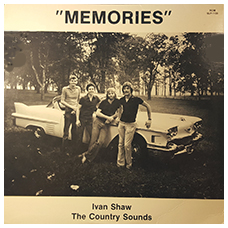 Ivan Shaw & The Country Sounds "Memories" (RCM Sound Studio, 1979-?) (LP)
Ivan Shaw & The Country Sounds "Memories" (RCM Sound Studio, 1979-?) (LP)
(Produced by B. Martin)
Soulful, sorrowful country ballads from Lexington, Kentucky, a measured, slow-tempo album with plenty of weepy pedal steel and a heavy debt to the mournful brand of countrypolitan ballads pioneered by Billy Sherrill and George Jones. Notably, the album starts out slow and stays there throughout, with only a couple of uptempo tracks -- one by Buck Owens and another by Eddie Rabbitt. The opening track, "Tired Of Being Your Fool," was first released as a single when the band first formed in 1974, and it's not clear if this is the same version or a re-recording... great song, either way. Ivan Howard Shaw (1949-2020) was born in rural Glasgow, Kentucky, over towards Bowling Green, but tapped into Lexington's early '70s country-rock scene to form his band -- drummer Jimmy Klug had been in several earlier bands, including a stint with bluegrass legend J. D. Crowe, and was with Shaw for several years before he and bass player Kevin Slucher peeled off to form a group called Uncle Lijah, which became a fixture on the Lexington bar-band scene for the remainder of the '80s. The real star on this album may be steel player Roy O'Hair, who anchors the slow songs with a deep, resonant tone -- not flashy, but heartfelt.
Gene Sisco "Coal Diggin' Country Boy" (Riverside Sound/Triple G Records, 19--?) (LP)
(Produced by Steve Hoffman)
This is a set of all original music written by Kentucky-born Gene Sisco a late-'Fifties rockabilly pioneer who cut several singles with a band called the Ramblin' Ramblers, as well as a group named The Deacons in the early 'Sixties. He started out playing in the band of Donnie Bowser, a hillbilly bopper from Ohio who cut several rockabilly tracks in 1956, including one called "Grandma Rock and Roll," which came out as a single under Sisco's name, launching Gene Sisco's solo career. Like a lot of first-generation rockers, he swung back into country music in later years, and even dove into the bluegrass scene in his native state, hanging out with folks like bandleader Hylo Brown. He worked as a newspaper columnist and hosted his own local radio show, and continued to record in a variety of styles. This album is a solidly country set and of a much later vintage -- the early '80s perhaps? -- not sure when the album below came out.
Gene Sisco "Just A State Of Mind" (Raw Country/US 23 Records, 19--?) (LP)
Ricky Skaggs -- see artist discography
J. D. Smith & Darlene Vance "Just The Two Of Us" (Transworld Records, 19--?) (LP)
(Produced by Joe Deaton)
Although this record label was from Bristol, Virginia, I believe J.D. Smith and Darlene Smith Vance were a brother-sister duo originally from Pike County, Kentucky. By the time Mrs. Vance passed away in 2001, she and the rest of her family, including JD and her other siblings, had moved to Fort Wayne, Indiana. Not sure when this album came out, but it has an early/mid-'80s look. The set list is mostly cover songs, though Smith contributes two originals, "She Took My Heart" and "That's How Love Hurts." Other songs on here include Kris Kristofferson's "One Day At A Time," the "Wild Side Of Life/Honky Tonk Angels" medley popularized by Waylon Jennings and Jesse Colter, as well as Marty Robbin's oft-recorded "You Gave Me A Mountain." And just in case anyone (else) is keeping track, they also play "Rocky Top."
Les Smithhart & His Super X Cowboys "Mama Don't Allow" (BACM, 20--?) (CD-R)
Fiddler and fiddle maker Leslie Benjamin Smithhart (1920-2004) was born in Henderson County, Kentucky -- the same neck of the woods that produced music legends such as Grandpa Jones, Jim Owen and guitarist Spider Rich... Mr. Smithart worked in several bands, including stints with hillbilly-era country legends such as Hank Williams and Hawkshaw Hawkins, and led his own group, the Super X Cowboys, which included his family members, Johnny and Wally Smithhart, as well as steel player Jerry Mandoricia and singer Jim Gatlin. In later years Mr. Smithhart played with southern gospel groups such as the Happy Goodman Family, but he gradually moved away from public performing and devoted himself to fiddlemaking... There's a very charming television profile story about his work as a luthier that may still be on YouTube... In addition, although there are few old records bearing his name. Mr. Smithart and his band worked for years on regional radio programs, providing enough material for this CD collection on the BACM collector label... Tasty stuff, with a jazzy western swing flair!
Sunny Spencer "Mama Don't Allow" (Ripcord Records, 1977) (LP)
A veteran of Roy Rogers backing band, The Sons Of The Pioneers, multi-instrumentalist Robert "Sunny" Spencer (1929-2005) was a decades-long show business veteran by the time he recorded this solo set... Born in Bowen, Kentucky, Spencer pursued a career that took him across the country. He led his own band for a number of years, and later performed at the Roy Rogers/Dale Evans Museum in Branson; Spencer also had long stints in Vegas and played dixieland jazz with Al Hirt and in the Gene Austin orchestra, along with his then-wife Dee Spencer (1925-2000) who later became a well-known Las Vegas publicist. Sunny Spencer is probably best remembered as a decades-long member of the fabled western band, The Sons Of The Pioneers, from 1984 until his death in Tucson, Arizona, while the group was on tour. His son-in-law, Gary LeMaster was also in the band for most of this period. I'm not sure what the story was behind this record, which came out on a regional label from the Pacific Northwest... was he living up there for a while? Anyway, on this disc he turns to some real hillbilly/western oldies, stuff like "When My Blue Moon Turns To Gold Again," along with a slew of western swing tunes. It kicks off with "Mama Don't 'Low," which was the big showstopper in his live act, with Spencer switching between the nearly two-dozen musical instruments he played. Nice stuff!
Sunny Spencer "...Sings The Songs Of Tommy Dilbeck" (Maywood Music, 1983)
A tribute to songwriter Tommy Tilbeck, who is probablybest remembered for penning the classic country ballad, "I'll Hold You In My heart," which was one of Eddy Arnold's first big hits. I'm not sure, but this may have been a cassette-only release.
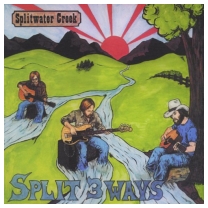 Splitwater Creek "Split 3 Ways" (Splitwater Creek, 1980) (LP)
Splitwater Creek "Split 3 Ways" (Splitwater Creek, 1980) (LP)
(Produced by Billy Sherrill)
A swell mix of progressive bluegrass and laid-back, eclectic country-rock... The Kentucky-based band included drummer Bobby Daniels, Steve Glasmeyer (piano), Brady Howle (bass), Rusty McElrath (banjo), Norris Sherrill (lead guitar) and Mike Stanton on pedal steel; fiddler Kenny Snow joined soon after this album came out and joined the group on tours of Kentucky and neighboring states. It's a pretty good record, though they could have varied the sound a little, and maybe mixed the banjo down of a few more tracks... By the way, does anyone know if Norris Sherrill was related to producer Billy Sherrill, who worked on this album, and whose own middle name was Norris? Maybe a nephew, or something? Just wondering.
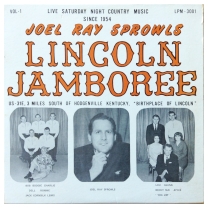 Joel Ray Sprowls' Lincoln Jamboree "Live Saturday Night Country Music Since 1954" (LP)
Joel Ray Sprowls' Lincoln Jamboree "Live Saturday Night Country Music Since 1954" (LP)
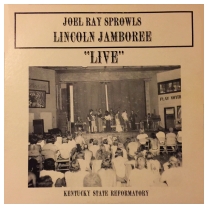 Joel Ray Sprowls' Lincoln Jamboree "Live - Kentucky State Reformatory" (Lincoln Jamboree Records, 1977) (LP)
Joel Ray Sprowls' Lincoln Jamboree "Live - Kentucky State Reformatory" (Lincoln Jamboree Records, 1977) (LP)
A prison concert album by an Opry-esque outfit that featured singers Camille Bingham, Lou Bingham, Charles Durham, Little Becky Sue, Ronnie Benningfield and Vicki Kidd, as well as instrumentalists Carlton Noel and Donnie Shafer. They sing gospel, folk songs and country oldies (such as the Louvin Brothers' "When I Stop Dreaming" and George Jones' "Window Up Above.") It's actually a surprisingly good album -- lots of energy and talent, solid pickers, great enthusiasm... The comedy skits aren't so great, but I bet the inmates still appreciated the thought.
 The John Stalls Family "Shoutin' Sounds" (Calvary Records, 19--?) (LP)
The John Stalls Family "Shoutin' Sounds" (Calvary Records, 19--?) (LP)
(Produced by Rusty Goodman)
Full-committed country gospel and twang-toned southern gospel by a family band from Madisonville, Kentucky, anchored by Pentecostal preacher John W. Stalls (d. 2000) and his wife Linda Stalls (1942-2021). The fun stuff on here are the uptempo numbers, which are marked by perky, bouncy, guitar-based country backing with bit of a Chet Atkins-meets-Hank Garland feel, including a a version of the Louvin Brothers' "Way Up On The Mountain." The less fun numbers are slower hymns, featuring syrupy, emotive solo vocal and lethargic arrangements. On balance, the twang outweighs the tedium, and this definitely falls into the more-country-than-not category. A shame the backing musicians aren't named, but I imagine they were Nashville pickers that regularly worked with producer Rusty Goodman.
Gary Stewart -- see artist profile
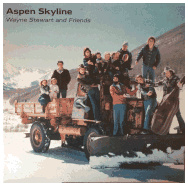 Wayne Stewart & Friends "Aspen Skyline" (Sierra Briar Records, 1979) (LP)
Wayne Stewart & Friends "Aspen Skyline" (Sierra Briar Records, 1979) (LP)
(Produced by John Delgatto)
An outstanding "progressive" bluegrass set with a song list that digs deep into the country-folk and Southern rock of the time. The album opens with a cover of the Allman Brothers' "Midnight Rider" and closes with "Ramblin' Man," mixing high lonesome classics by Bill Monroe and the Stanley Brothers with grassed-up rock songs by J. J. Cale and Stephen Stills. Wayne Stewart was a Kentucky native and childhood friend of newgrasser Sam Bush; he tried to make the scene in hippie California, but returned home in the early '70s to co-found a band called the Bluegrass Alliance. Then he ping-ponged around for a while -- he recorded an album with a teenaged Sam Bush spotlighted in the band Poor Richard's Almanac, and went back to the West Coast to kick around with the Dillards and other folks in SoCal scene. This album was his musical swan song -- according to the liner notes, Stewart got born again and gave up on the business side of music, but he agreed to record this album for Sierra Briar, and fronted a great band packed with little-known artists. Fiddler Vassar Clements adds plenty of tasty licks, and a couple of guys were in John Denver's early-'70s band, dobroist Steve Weisberg and banjo picker John Sommers (who had composed Denver's big hit, "Thank God I'm A Country Boy." Stewart was a fine picker himself, but it's as a singer that he really distinguishes himself -- his earthy, soulful, country-tinged vocals remind me of Peter Rowan's singing of the same era, rural stuff with a tinge of Jimmy Martin-style bluesiness. This is a nice record, definitely worth checking out!
 Ben Story "Sings Hootenanny Favorites" (Lemco Records, 1964) (LP)
Ben Story "Sings Hootenanny Favorites" (Lemco Records, 1964) (LP)
A straight-up set of 'Sixties folk-revival ballads, performed solo by a fresh-faced, buzzcut, Kentucky-born acolyte of the Kingston Trio... It ain't country, but it caught my eye because it's a very early release on the Lemco label, which is better known for its bluegrass releases, but also pressed a few custom discs for rock bands and the like. Anyway, if you like standard-issue clean-cut coffeehouse folk, you might dig this disc. Ben Story apparently recorded some singles for Plantation Records as well; no indication that he was related to North Carolina bluegrass legend Carl Story... but ya never know!
Lois Ann Struck "Lonely" (Plantation Records, 1976) (LP)
(Produced by Shelby Singleton Jr.)
A bit of a mystery album, issued on the semi-major Plantation label though possibly a custom pressing. Biographical info on this gal is hard to come by but she seems to have been from Lexington, Kentucky or thereabouts, playing local shows with her own trio as early as 1974, while cutting a few singles in Nashville, including a duet with producer Bob Struck. Back home in the late 'Seventies, she performed in bands led by Sam Stockard and Marty York. During the late '80s, she seems to have been doing some DJ-ing in locals venues and later still (in the early '90s) was doing club dates with a guy named Mike Roy.
 Sweetwater "The Sky's The Limit" (Sweetwater Records, 1983) (LP)
Sweetwater "The Sky's The Limit" (Sweetwater Records, 1983) (LP)
(Produced by Sweetwater & Don Lee)
A country-rock outfit from Scottsville, Kentucky whose repertoire included two early-'80s Rodney Crowell songs, "Ain't Livin' Long Like This" and "Shame On The Moon," as well as one of their own that was a little on the outlaw side, "I'm Stoned."
 Keith Sykes "1-2-3" (Vanguard Records, 1971) (LP)
Keith Sykes "1-2-3" (Vanguard Records, 1971) (LP)
(Produced by Jack Lathrop)
I'm trying really, really hard not to stray into mainstream folk music while putting together this hippiebilly guide, but in this case I'll make an exception. Keith Sykes was one of the many second-tier folkies who labored under the long shadow of Bob Dylan, and while some made the transition to the more expansive singer-songwriter sound, others struggled to remain relevant. Kentucky-born Sykes came late to the party, starting his career in 1968, and this was his second album. In some ways, this record is as good a demarcation between the folk movement's glory days and it's near-final demise: Skyes beats against the walls of genre, still hammering out Dylanesque/Wood Guthrie-ish acoustic-guitar-and-vocal ditties, but his own sense of frustration and irritation bleeds through from start to finish. Two songs speak to this disaffection... The title track, "1-2-3," is a remarkable blast of pure acoustic nihilism, a flat-out precursor to '70s punk, in which Sykes, pounding away on the frets and complaining about his songwriting, swears in the first verse (singing about "beatin' the s--- out of my guitar...") and having crossed the line into the un-airable, goes on to paint a strongly negative character portrait, using the n-word in a surprisingly uninhibited way in the last verse, with a guttural "1-2-3, 1-2-3!" as the song's chorus... All that's missing is the oi-oi-oi and you've got London, 1978 on your hands. A lot of the other tunes are tedious on their surface -- more strummy Dylan stuff -- but the album's closer, "Like A Candle," produces the emotional resonance I was searching for, and it, too, seems like a rueful folk music obituary. It's posed as a mournful love ballad, but feels like the thematic bookend to Side One's "1-2-3":
Many, many nights go by me
I'm older now with another song
But I'll remember once there was
A light inside, but now it's died
Burnin', like a candle, it has gone.
Sykes went on to move decisively into country music and country-rock... He wrote songs with John Prine, toured with Jerry Jeff Walker and as a member of Jimmy Buffett's band, and had several songs recorded by Rosanne Cash and others. But the hot blast of this album's title track is pretty unique for the time -- the Fugs did stuff like that, but they were just trying to shock the rubes, while Sykes really seemed to be expressing himself. Not much twang on here, but it's an intriguing transitional album. Oh, and hey, Keith, if you're out there, I'd love to hear the story behind this album. Were you really as cynical and burnt-out as you sounded?
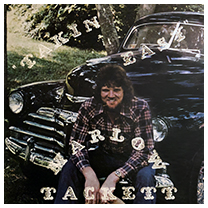 Marlow Tackett "Takin' It Easy" (Palace Records, 1978) (LP)
Marlow Tackett "Takin' It Easy" (Palace Records, 1978) (LP)
(Produced by Bill Holmes & Jake Hottell)
Originally from Pike County, Kentucky, singer Marlow Tackett (1944-2014) ran a mid-sized music hall in Piketown called Marlow's Country Palace, which he opened in 1975. The venue hosted local performers as well as national stars but became best known for the annual Christmas concerts Mr. Tackett hosted as fundraisers providing aid to needy children struggling against the poverty that was endemic to many Appalachian families. In the late 'Seventies Tackett was championed by deejay Ralph Emery, and landed a contract with RCA Victor, where he released a string of singles in the early '80s. He had a big, schmaltzy, almost operatic vocal style, with an obvious debt to Elvis Presley, who was Tackett's idol. This album, which predates his major label years, was recorded in Nashville, apparently with a mix of Tackett's own "Southern Comfort" band, and some Nashville hired guns. There are several covers songs -- stuff by Billy Edd Wheeler and Tony Joe White, Jame Taylor's "Bartender's Blues," Bob Seger's "Turn The Page" -- but also a slew of original tunes composed by several of the Nashville pickers. Producer/guitarist Bill Holmes contributes "True Love Is Hard To Find," while other songs are provided by rhythm guitarist Jimmy Payne, lead player Jud Phillips and Wayne Marshall, who plays harmonica. Among the other musicians are Jim Glaser and Doyle Grisham on pedal steel, as well as Walt Cunningham on piano.
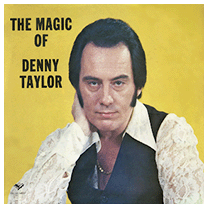 Denny Taylor "The Magic Of Denny Taylor" (Holly Records, 1985) (LP)
Denny Taylor "The Magic Of Denny Taylor" (Holly Records, 1985) (LP)
(Produced by Josh Graves & Sonny Deaton)
Definitely a real-deal vanity album, recorded by singer Denny Taylor of Walton, Kentucky, with considerable help from some mostly-bluegrass heavyweights, including dobro legend Josh Graves, as well as fiddler Kenny Baker, guitarist Tom Campbell, steel player Sonny Deaton and others. About half the songs are originals by Denny Taylor, who emotes with all his might, but is, well -- to be honest -- a little on the flat side as a vocalist, though fully committed to his work. His songs include "Bea," "Old Picker's Home," "Playing The Jukebox," "Say Goodbye Today" and When Sherry Smiled At Me," while another track ("Why'd This Have To Happen On A Sunday") composed by Richard E. Wolf shares the same publisher, and also seems to be unique to this album. (Thanks to The Motel Lounge blog for keeping this one on the radar.)
 The Tinhorn Express "Jumping The Tracks" (Lemco Records, 1979) (LP)
The Tinhorn Express "Jumping The Tracks" (Lemco Records, 1979) (LP)
(Produced by Cecil Jones & Matt Presby)
A progressive bluegrass/acoustic swing band whose repertoire was a mix of bluegrass, country and western swing, with some material written by lead singer Steve Goins, including the title song, "Jumping The Tracks." This also includes yet another cover of "Friend Of The Devil," in case anyone is keeping a list. Not 100% sure, but I think these guys were from Kentucky...
 Mary Lou Turner "Mary Lou Turner" (Jamboree USA Records, 1973) (LP)
Mary Lou Turner "Mary Lou Turner" (Jamboree USA Records, 1973) (LP)
(Produced by Ray Pennington & Jim Sutton)
Before pairing up with Top 40 crooner Bill Anderson, Kentucky-born singer Mary Lou Turner had been kicking around for about a decade or so, including a stint at the WWVA Wheeling Jamboree show, where she worked from 1965-73, during the time when the venue changed its name to Jamboree USA. Starting in the mid-'Sixties, Turner recorded a few singles, including sides for Starday, 20th Century Fox and some smaller labels, including one for the fledgling Jamboree label, which was an offshoot of the Jamboree USA theme park. The two songs on her Jamboree single, "I Built A Wall" and "Like We Used To" are included here, along with a bunch of other original material... The following year, in '74, she moved to Nashville, signed to MCA and after a slow rollout, hit the bigtime as Anderson's duet late-'Seventies duet partner. By decade's end, the chart hits petered out, and Turner went on to play various Branson venues, and released at least one more solo album in addition to the LPs and singles she recorded for MCA.
Mary Lou Turner "The Girl Next Door" (Silver Dollar Records, 1987) (LP)
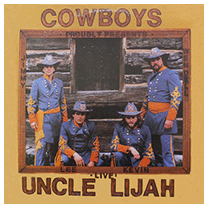 Uncle Lijah "Cowboys Proudly Presents: Uncle Lijah Live" (King Kelly Records, 1983) (LP)
Uncle Lijah "Cowboys Proudly Presents: Uncle Lijah Live" (King Kelly Records, 1983) (LP)
A country-oriented bar band from Lexington, Kentucky, cutting a live album as a souvenir of a gig at the Cowboys club, which these days is a strip joint, but back then may have been more of a country bar. The house band at the time, Uncle Lijah was made up of ex-members of various local rock and country bands... The repertoire was mostly cover tunes, including a few scary pop covers such as "Part Time Lover" and "We've Got Tonight," as well as "Amarillo By Morning," which had just bubbled up from the Texas scene to become one of George Strait's first big hits. Though this seems to be the group's only album, they were fixtures on the local scene for many years to come, playing shows right up through the early '90s and '00s as well. (Thanks to Shawn Chambers' Lexingtunes site for the tip on this one... and on the early 'Seventies band Vision, which included drummer Jimmy Klug, who co-founded Uncle Lijah... Thanks also for the use of this cover photo!)
Elva Hare Walker "Piano Lady: The Queen Of The D-104" (Ross Sound Records, 197--?) (LP)
(Produced by Woodring M. Fryer & Elva Hare Walker)
Country and country gospel, played on the piano and the Hammond D-104 organ... Elva Hare Walker (1933-2011) was from Henderson, Kentucky, where she played in her local church, and where she recorded this album. She was backed by the Ross family -- Jack Ross (bass) Dave Ross (rhythm guitar) and Clyde Ross on vocals -- along with Steve Cobb on lead guitar and Danny Miles on drums. About half the tracks are gospel songs, including Dottie Rambo's "Build My Mansion Next Door To Jesus," Ed Burnett's "The Night I Talked To The Lord On My CB Radio," and the old-time classic, "Turn Your Radio On." She also plays secular stuff, like "I Can't Stop Loving You," "Release Me" and "Your Cheating Heart."
Wayne & Glenn "Wayne And Glenn" (Lemco Records, 197--?) (LP)
(Produced by Cecil Jones)
I couldn't find much info about these shaggy-lookin' fellas -- guitarist Wayne Davis and bass player Glenn Little -- though I believe they played in bar bands in and around Lexington, Kentucky for most of the 1970s... They looked like rockers, though they recorded on the bluegrass-y Lemco label, and there is a song called "It Don't Look Like A Honky Tonk In Here," as well as one called "Dixie," so there's definitely some twang in the mix as well. Anybody know much about these two?
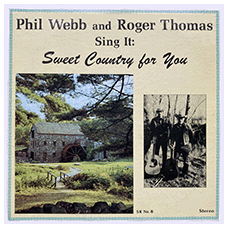 Phil Webb & Roger Thomas "Sing It: Sweet Country For You" (Sandi Records, 1984) (LP)
Phil Webb & Roger Thomas "Sing It: Sweet Country For You" (Sandi Records, 1984) (LP)
(Produced by Bob Angel & Jack Gilmer)
A charmingly imperfect album, and perhaps an archetypal "private label" record... Although it's billed as a split LP, old-timer Phil Webb sings lead on all but two of the tracks, and even though he has kind of a wobbly voice, he really throws himself into it. His reedy tones are reminiscent, perhaps, of square-peg singers as Vernon Oxford or Dick Feller, where in an odd way the imperfections throw more light on the singer's passion, as opposed to his technical chops. Anyway, this seems to be some sort of songwriter's demo set, or maybe one of those supposed "tax writeoff albums..." Mr. Webb was from Winchester, Kentucky, while the Sandi label has an address in Floria... Most of the songs were written by producer Bob Angel, with two others penned by Johnny Selph: "Memories Of The Past" and "Watch The Watchers." They went whole-hog booking studio time with an A-list Nashville crew, including Sonny Garrish on steel guitar and dobro; Greg Gailbraith on electric lead; Willie Rainsford playing piano, and Mark Casstevens on rhythm guitar and banjo, among others... Of course we've heard these guys play on a bazillion sessions, including plenty of indie records like this one, but they really seem to have been into it on this one, perhaps as inexplicably charmed by Mr. Webb as I was... The material is uneven though there are some tracks that might deserve a closer look from modern-day twangsters looking for older material. Not a "great" record, but charming in an odd way.
The Woodettes "Six Hours On The Cross" (Redwood City Sound, 1971) (LP)
(Produced by Molly O'Day-?)
A sibling-harmony bluegrass-gospel group made up of several sisters from the Woods family, originally from Lawrence County, Kentucky... The gals all married and took on new surnames -- Joyce Berry (bass vocals), Jackie Brunner (alto), Willa Goins (lead), Mary Davis (tenor) and Shirley Kitchen (alto) -- and moved to various parts of Kentucky and Ohio. They were later brought together as a musical group at the insistence of their parents, while lead singer Willa seems to have married one of the Goins Brothers, the bluegrass band backing them on this and their other albums, while Joyce gives a contact address in Columbus, Ohio. According to the liner notes on this early 'Seventies album, the sisters had a gospel show on radio station WEMM, in Huntington, West Virginia
The Woodettes "Country Gospel" (Glory Land Records, 1972) (LP)
The Woodettes "Fireside Memories" (Jessup Records, 1973) (LP)
The Woodettes "Just One Rose Will Do" (Glory Land Records, 1977) (LP)
(Produced by Jack Casey & Marvin Jones)
Gene Wright "Horse Music" (1979-?) (LP)
(Produced by Gene Wright, Cecil Jones & Bob Goff)
Kind of a sweet story behind this one... Gene Wright was a young fella from Lexington, Kentucky who wrangled horses on the show horse circuit. According to the liner notes, he calmed the horses by playing music in the stalls, and his preferred instruments included the Hammond B-3 and ARP synths; on this album he also plays the grand piano, though I doubt he would bring one out into the barn, at least not on a regular basis... He's accompanied here by steel guitarist Vince Emmett and Rex Hart on drums, on a set that mixes country and pop material. But wait, let's back up a little: playing keyboards to the horses? I bet the gals just swooned over that one!
 Various Artists "THE INDEPENDENT SOUND ALBUM" (Independent Sound Records, 1977) (LP)
Various Artists "THE INDEPENDENT SOUND ALBUM" (Independent Sound Records, 1977) (LP)
(Produced by David Heavener, Pay Kirtley, Jay Petach & Dana Thomas)
A sorta-kinda song-poem set where a studio band organized by Kentucky-based songwriter-producer David Heavener backs about a dozen different local artists in a sprawling set of original country-and-rock tunes. Heavener was a real character, an aspiring songwriter who headed to Nashville in the early 'Seventies, where he had some success as a composer, and as a staff musician for the Hee-Haw TV show, though later he returned to Louisville and tried to make it as a private-press record producer. The funny thing about this album is that over half the songs were written by Heavener himself, with the remainder apparently penned by other locals. The house band features Heavener on rhythm guitar and strings, along with George Dawson (synthesizer), Rick Fugate (bass), Mell Pearce playing lead guitar, steel guitar and bass, and Mike Shirley on drums; the performers include Frank Carnes, Elsun Henley, Karen Mintner, Vikki Mitchell, Doug Sego, Paul Shepard, Linda Sparrow, and the bands Second Heaven, Traveler, Portrait In Black And White, and The Rocky West Band. As far as I can tell, these were all Louisville locals, with some of the band members pursuing musical careers (George Dawson cut an album of jazz tunes) though most of the individual singers seem to have been strictly amateurs. A second album also came out (below) though it was more rock-oriented. Producer David Heavener released several country singles under his own name, and at least one full album in the '80s, although he later turned towards the film industry, and became known for producing super-low-rent, quick-and-dirty genre knockoffs with titles like Jurassic Women, Kill Crazy and Lethal Ninja, and one called Dawn Of The Living Dead, which decidedly did not have the George Romero seal of approval.
Various Artists "THE INDEPENDENT SOUND ALBUM, v.2" (Independent Sound Records, 1978) (LP)
(Produced by David Heavener)
Various Artists "LINCOLN JAMBOREE FAVORITES" (Lincoln Jamboree Records, 1978) (LP)
(Produced by Wayne Sexton)
This souvenir album was apparently a "birthday" celebration, marking the 24th anniversary of this Hodgenville, Kentucky hillbilly venue. The 1978 cast included Ronnie Benningfield, Camille Bingham, Lou Bingham (and their family band, The Binghams), Charles Durham, Cornsilk Lewis, Little Becky Sue, steel player Carlton Noel, and Vicki Kidd Sexton, backed by the house band, The Jamboree Gang.
 Various Artists "(JOHN LAIR'S) RENFRO VALLEY BARN DANCE" (Renfro Valley Records, 1966) (LP)
Various Artists "(JOHN LAIR'S) RENFRO VALLEY BARN DANCE" (Renfro Valley Records, 1966) (LP)
The Kentucky-based Renfro Valley Barn Dance was a nationally famous country music program, first organized in the 1930s by veteran radio performer John Lair, who built the "barn dance" format through a series of radio shows, assembling an early cast in the late 'Thirties that included future superstar Red Foley as its headliner. First properly branded as the Renfro Valley Barn Dance in 1937, the program migrated from WLS, Chicago to stations in Cincinnati and then Louisville, with the related live broadcasts staged in a variety of venues before Lair's own music hall -- "The Old Barn" -- opened its doors in November, 1939. The Barn Dance became a central hub for Eastern country music, a regional touchstone both live and on the air. Ironically, by the time these cast-member albums came out in the late 1960s, the show was in decline, showcasing fewer big stars and fielding many more young hopefuls. On this album, the performers included singers Red Brigham and Boyd Ingram, fiddler Wayne Marlin, guitarist Don Harper, the duo of Russ Fisher and Jo Fisher, old-timer Buddy Durham, and a vocal group called The Farmer Sisters, which is a delight to fans of off-the-radar local musicians. Around this time, however, some Nashville guys put together a takeover bid and John Lair got bought out by 1968, then stewed over it for the better part of a decade until he finally leveraged a buyback in the late 'Seventies. His "new" show notably re-constituted on of their older popular all-gal groups -- now billed as The New Coon Creek Girls, the band helped launch the career of bluegrass icon Dale Ann Bradley.) The Barn venue was sold again after Mr. Lair died in 1985, and has passed hands several times since, yet continued as a live music venue for many years to come.
 Various Artists "THE RENFRO VALLEY GATHERIN' " (Jamboree Recordings, 19--?) (LP)
Various Artists "THE RENFRO VALLEY GATHERIN' " (Jamboree Recordings, 19--?) (LP)
Running in tandem to the main Barn Dance shows was a gospel-oriented spin-off called the Renfro Valley Gatherin', which shared much of the same musical cast as the secular programs. This edition of the Gatherin' included The Farmer Sisters, the Fishers, guitarist Don Harper and a late edition of the Coon Creek Girls, as well as the show's generically billed chorus and choir. Gospel and sentimental songs on Side One, and more secular but still weepy and nostalgic stuff on Side Two.
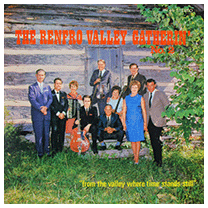 Various Artists "THE RENFRO VALLEY GATHERIN' NO.2" (Jamboree Recordings, 1969-?) (LP)
Various Artists "THE RENFRO VALLEY GATHERIN' NO.2" (Jamboree Recordings, 1969-?) (LP)
A largely different lineup than on previous albums, though The Farmer Sisters are still on board. Several tracks feature Nick Foley, a guy who'd been around for a while, worked at different venues and recorded several singles and albums of his own...Most of the the other tracks are credited simply to "The Choir," and were gospel tunes, but for the most part the show seems to have shed its established stars, notably the Coon Creek Girls band, which may have broken up by this point. I think there are a few other Renfro Valley albums I'll need to track down at some point... I'll keep you posted, okay?
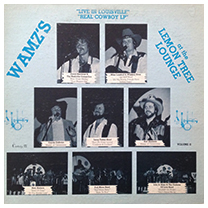 Various Artists "WAMZ: LIVE IN LOUISVILLE -- REAL COWBOY LP/AT THE LEMON TREE, v.2" (Century VII Records, 1982) (LP)
Various Artists "WAMZ: LIVE IN LOUISVILLE -- REAL COWBOY LP/AT THE LEMON TREE, v.2" (Century VII Records, 1982) (LP)
A live set recorded at the Lemon Tree Lounge, in Louisville, Kentucky... Most of the musicians are pretty obscure, although Mike Lunsford (who sings "Fourteen Carat Mind" and "All My Friends Have Settled Down") had some national success in the 'Seventies, when he was recording for the Gusto label. Other artists include John Allen & The Outlaws Of Love, The Full Moon Band, New Horizon, The Leroy Parker Band and David Heavener's Nashville Connection, each of whom contribute two tracks. Heavener seems to have been the guiding force behind the Century VII label; he also produced an album by singer Connie Johnson, mostly made up of songs that he had composed. This project's sponsor, WAMZ-FM, went on the air in 1977 as Louisville's first full-time country station, and was establishing itself as a regional voice when this disc was produced. I haven't seen the first volume, but it must be out there somewhere!
 Various Artists "WBGN GOODIES '81" (WBGN/Zack Records, 1981) (LP)
Various Artists "WBGN GOODIES '81" (WBGN/Zack Records, 1981) (LP)
(Produced by David T. Dorris)
Less country music on this local scene sampler by radio station WBGN and way more emphasis on rock bands than on the other compilations listed here. It's also a regionally diverse set, with artists from several different states, including Indiana, Kentucky and Tennessee reflecting the crossroads status of WBGN's locale in Bowling Green, Kentucky. The group I had the most hope for, Reggie Jaggers & Ricochet, does have a pedal steel in the mix, but their song, "Old Friend" is more of a semi-acoustic rock ballad, ala Badfinger, rather than a plangent twangfest. The mostly all-gal group called Yo Mama offers a perky, group vocals country-pop sound on "Down On The River" while a gal named Beverly Smith has the most solidly country track on the album, "Lovin' You Again," with a fairly generic arrangement, although her Rosanne Cash-esque vocals were pretty nice. Mainly this is a rock record, but that being said there are a couple of really good tracks, notably the more uptempo, new wave-y numbers. Hi-Fi's "Rebound" is a fun, super-frenetic power-pop song, with pleasantly jittery vocals by Barbara Rosenthal, and The Flexables had an almost equally satisfying song with a similar vibe, "Neanderthal Phone Call," reminiscent perhaps of Romeo Void, while Steven Biggers gets a little Greg Kihn-ish on his tune, "Lillie." The biggest irony of this album is that one of the three acts that get more than one track, Sgt. Arms, was led by lead singer and guitarist Bill Lloyd, who I believe was the same guy from Bowling Green who later found tremendous commercial success as half of the country duo Foster & Lloyd, though here he's in one of the more traditional-sounding hard rock bands, with plenty of chunky power-chord guitar. Go figure!
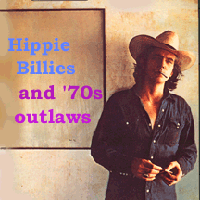 Locals Only: Kentucky Twang This page collects artist profiles and record reviews of country music from the state of Kentucky. It's part of a larger guide to unsigned and off-the-radar regional artists from years gone by, which is also part of the even larger Guide To Hick Music on Slipcue.com. Most of the artists here are little-known locals, bar-band singers, etc., but the list also includes Nashville stars who were from the state, as well as some bluegrass and gospel artists, etc. This is an ongoing projects, with new stuff coming in all the time, and we welcome any recommendations, additions or corrections.
Locals Only: Kentucky Twang This page collects artist profiles and record reviews of country music from the state of Kentucky. It's part of a larger guide to unsigned and off-the-radar regional artists from years gone by, which is also part of the even larger Guide To Hick Music on Slipcue.com. Most of the artists here are little-known locals, bar-band singers, etc., but the list also includes Nashville stars who were from the state, as well as some bluegrass and gospel artists, etc. This is an ongoing projects, with new stuff coming in all the time, and we welcome any recommendations, additions or corrections.
 Texas Anderson & Jeff Martin "Songs In Boone Country" (RCM Records, 19--?) (LP)
Texas Anderson & Jeff Martin "Songs In Boone Country" (RCM Records, 19--?) (LP)
 The Arnold Chinn Group "Take It On The Chin" (Twin Spin Records, 1978) (LP)
The Arnold Chinn Group "Take It On The Chin" (Twin Spin Records, 1978) (LP)
 The Arnold Chin Band "Hometown Heroes" (Twin Spin Records, 1981) (LP)
The Arnold Chin Band "Hometown Heroes" (Twin Spin Records, 1981) (LP)
 Tom Asbridge "Moments With Tom" (Square Records, 19--?) (LP)
Tom Asbridge "Moments With Tom" (Square Records, 19--?) (LP)
 Johnny B. & Phase II "Rowntowner Motor Inn Presents..." (QCA Records, 1971-?) (LP)
Johnny B. & Phase II "Rowntowner Motor Inn Presents..." (QCA Records, 1971-?) (LP)
 Willie B & The Drifter's Caravan "Blue Kentucky Boy" (Willie B Enterprises, 1973-?) (LP)
Willie B & The Drifter's Caravan "Blue Kentucky Boy" (Willie B Enterprises, 1973-?) (LP)
 Larry Boggs & The Country Round-Ups "That Look Of Leaving" (Redwood City Sound, 1976) (LP)
Larry Boggs & The Country Round-Ups "That Look Of Leaving" (Redwood City Sound, 1976) (LP)
 Dan Brock & Louise Brock "Kentucky Songbag" (Donerail Records, 1968) (LP)
Dan Brock & Louise Brock "Kentucky Songbag" (Donerail Records, 1968) (LP)
 Ford Brock & The Thunderbirds "Just Plain Old Country" (Redbird Records, 1975-?) (LP)
Ford Brock & The Thunderbirds "Just Plain Old Country" (Redbird Records, 1975-?) (LP)
 Carlen & Spencer "If I Had A Nickel" (1982) (LP)
Carlen & Spencer "If I Had A Nickel" (1982) (LP)
 The Carlisle Family "The Carlisle Family Album: Old Time Great Hymns" (Old Homestead Records, 1982) (LP)
The Carlisle Family "The Carlisle Family Album: Old Time Great Hymns" (Old Homestead Records, 1982) (LP)
 Steve Cauthen "...And Steve Cauthen Sings Too!" (Bareback Records, 1977-?) (LP)
Steve Cauthen "...And Steve Cauthen Sings Too!" (Bareback Records, 1977-?) (LP)
 Cee Jay "Pure Country" (Amoura Records, 1980) (LP)
Cee Jay "Pure Country" (Amoura Records, 1980) (LP)
 The Charles Brothers "The Charles Brothers" (Lemco Records, 1973) (LP)
The Charles Brothers "The Charles Brothers" (Lemco Records, 1973) (LP)
 Harold Cheek "I Gotta Sing My Song" (Tom Tom Records, 19--?)
Harold Cheek "I Gotta Sing My Song" (Tom Tom Records, 19--?)
 Clark & Andy "Throwin' A Party" (Ancor Records, 197--?) (LP)
Clark & Andy "Throwin' A Party" (Ancor Records, 197--?) (LP)
 Mickey Clark "Late Arrival" (Evergreen Records, 1987) (LP)
Mickey Clark "Late Arrival" (Evergreen Records, 1987) (LP)
 Mickey Clark "Winding Highway" (Ear-X-Tacy, 2009)
Mickey Clark "Winding Highway" (Ear-X-Tacy, 2009)
 Mark Collier "Summer Wine" (Audio Creations, 197--?) (LP)
Mark Collier "Summer Wine" (Audio Creations, 197--?) (LP)
 Country Folk "Down To Earth" (Mugtime Records, 1976) (LP)
Country Folk "Down To Earth" (Mugtime Records, 1976) (LP)
 The Country Road "Our Very Best" (Renee Records, 19--?) (LP)
The Country Road "Our Very Best" (Renee Records, 19--?) (LP)
 Red Creech "Back Home" (Clark Country Records, 1977-?) (LP)
Red Creech "Back Home" (Clark Country Records, 1977-?) (LP)
 Ward Darby "(Meet Ward Darby With Nicky, Steve And Gene As They Go) Up Country" (Lemco Records, 197-?) (LP)
Ward Darby "(Meet Ward Darby With Nicky, Steve And Gene As They Go) Up Country" (Lemco Records, 197-?) (LP)
 Ward Darby "World Of The Night People" (1978) (LP)
Ward Darby "World Of The Night People" (1978) (LP)
 Ward Darby "Electric Country" (2019)
Ward Darby "Electric Country" (2019)
 Guy Drake "Welfare Cadillac" (Royal American Records, 1970) (LP)
Guy Drake "Welfare Cadillac" (Royal American Records, 1970) (LP)
 The Wes England Family "Touched By The Nail Scarred Hand" (Artist's Recording Company, 19--?) (LP)
The Wes England Family "Touched By The Nail Scarred Hand" (Artist's Recording Company, 19--?) (LP)
 Don Everly "Brother Jukebox" (ABC/Hickory Records, 1977)
Don Everly "Brother Jukebox" (ABC/Hickory Records, 1977)
 Lanita Eversole "No Crippled Girls In Heaven" (RCM Records, 1976) (LP)
Lanita Eversole "No Crippled Girls In Heaven" (RCM Records, 1976) (LP)
 Nancy Eversole "Kentucky Woman" (Artists Recording Company/Custom Fidelity Records, 1973-?) (LP)
Nancy Eversole "Kentucky Woman" (Artists Recording Company/Custom Fidelity Records, 1973-?) (LP)
 Eddie Fannon "The Bluegrass Side Of Eddie Fannon" (American Heritage Records, 1980)
Eddie Fannon "The Bluegrass Side Of Eddie Fannon" (American Heritage Records, 1980)
 Kenny Felts "Sings Tribute To Red Foley" (Jewel Records, 1970-?) (LP)
Kenny Felts "Sings Tribute To Red Foley" (Jewel Records, 1970-?) (LP)
 Ben Ferrell "Talkin' 'Bout Kentucky" (Caravelle Records, 1976) (LP)
Ben Ferrell "Talkin' 'Bout Kentucky" (Caravelle Records, 1976) (LP)
 Nick Foley "Tombstone Junction Presents Nick Foley" (TJ Records, 1970?) (LP)
Nick Foley "Tombstone Junction Presents Nick Foley" (TJ Records, 1970?) (LP)
 Jim Ford "Big Mouth USA -- The Unissued Paramount Album" (Bear Family Records, 2009)
Jim Ford "Big Mouth USA -- The Unissued Paramount Album" (Bear Family Records, 2009)
 Will Franklin "I Get High On Country Music" (Seatac Records, 1974) (LP)
Will Franklin "I Get High On Country Music" (Seatac Records, 1974) (LP)
 Edgar Fultz & Daughter "Way Below The Bottom" (Jewel Records, 1981-?) (LP)
Edgar Fultz & Daughter "Way Below The Bottom" (Jewel Records, 1981-?) (LP)
 Theron Gooslin "Would You Believe" (Viper Records, 1971-?) (LP)
Theron Gooslin "Would You Believe" (Viper Records, 1971-?) (LP)
 The Gospel Brothers "Men Are So Busy" (MMP/Mountain Music Productions, 1973) (LP)
The Gospel Brothers "Men Are So Busy" (MMP/Mountain Music Productions, 1973) (LP)
 The Green-Bo Valley Sound "Eyes Of Faith" (K-Ark Records, 197--?) (LP)
The Green-Bo Valley Sound "Eyes Of Faith" (K-Ark Records, 197--?) (LP)
 The Greenbo Valley Sound "Mother Earth" (K-Ark Records, 197--?) (LP)
The Greenbo Valley Sound "Mother Earth" (K-Ark Records, 197--?) (LP)
 Johnny Greene "Live At Olive Hill" (Major Recording Company, 1977) (LP)
Johnny Greene "Live At Olive Hill" (Major Recording Company, 1977) (LP)
 Stan Gunn "Two Sides Of The Stan Gunn Musical Revue" (Y Records, 19--?) (LP)
Stan Gunn "Two Sides Of The Stan Gunn Musical Revue" (Y Records, 19--?) (LP)
 Stan Gunn "...Sings Town And Country" (Sugar Hill Records, 1974) (LP)
Stan Gunn "...Sings Town And Country" (Sugar Hill Records, 1974) (LP)
 Gwen's Country Jubilee "Gwen's Country Jubilee" (Starr Records, 1973-?) (LP)
Gwen's Country Jubilee "Gwen's Country Jubilee" (Starr Records, 1973-?) (LP)
 Hillman Hall "One Pitcher Is Worth A Thousand Words" (Warner Brothers, 1975) (LP)
Hillman Hall "One Pitcher Is Worth A Thousand Words" (Warner Brothers, 1975) (LP)
 Jack Hall "Don't Know Where I'll Be Tomorrow" (Riverside Records, 1978) (LP)
Jack Hall "Don't Know Where I'll Be Tomorrow" (Riverside Records, 1978) (LP)
 Joe B. Hall "Kentucky Calling Me" (Classic Records, 1981) (LP)
Joe B. Hall "Kentucky Calling Me" (Classic Records, 1981) (LP)
 Charlie Harrison "Country Singer" (Ark Record Company, 1985-?) (LP)
Charlie Harrison "Country Singer" (Ark Record Company, 1985-?) (LP)
 David Heavener "Outlaw Force" (Soundtrack) (Century VII Records, 1988) (LP)
David Heavener "Outlaw Force" (Soundtrack) (Century VII Records, 1988) (LP)
 Gene Husky "Stage Records Presents..." (Stage Records, 1981) (LP)
Gene Husky "Stage Records Presents..." (Stage Records, 1981) (LP)
 Deb Hyer "One Man Band" (Lemco Records, 1973) (LP)
Deb Hyer "One Man Band" (Lemco Records, 1973) (LP)
 Deb Hyer "Nashville Streaker" (Lemco Records, 1976-?) (LP)
Deb Hyer "Nashville Streaker" (Lemco Records, 1976-?) (LP)
 John Ireson "In Lexington" (Lemco Records, 1973) (LP)
John Ireson "In Lexington" (Lemco Records, 1973) (LP)
 Lois Jane "Across The Bridge" (Big Gospel Records, 1968-?) (LP)
Lois Jane "Across The Bridge" (Big Gospel Records, 1968-?) (LP)
 Lois Jane "Come Along With Me" (Praise Song Records, 197--?) (LP)
Lois Jane "Come Along With Me" (Praise Song Records, 197--?) (LP)
 Jim Kearce "Sings All Kinds Of Country" (K & L Records, 19--?) (LP)
Jim Kearce "Sings All Kinds Of Country" (K & L Records, 19--?) (LP)
 Ernie Lee "Ernie Lee's Big Thirteen" (Century Custom Recording Service, 1965-?) (LP)
Ernie Lee "Ernie Lee's Big Thirteen" (Century Custom Recording Service, 1965-?) (LP)
 Ernie Lee "The Kentucky Balladeer" (Binge Disc/Bronco Buster, 2000)
Ernie Lee "The Kentucky Balladeer" (Binge Disc/Bronco Buster, 2000)
 Gary LeMaster "LeMaster '83" (Cary Records, 1983) (LP)
Gary LeMaster "LeMaster '83" (Cary Records, 1983) (LP)
 Denny Lile "Denny Lile" (Bridges Records, 1972) (LP)
Denny Lile "Denny Lile" (Bridges Records, 1972) (LP)
 Little Enis "I Kept The Wine And Threw Away The Roses" (Lemco Records, 1974) (LP)
Little Enis "I Kept The Wine And Threw Away The Roses" (Lemco Records, 1974) (LP)
 Jimmy Lloyd "Snowbird" (Crown Records, 1970/71-?) (LP)
Jimmy Lloyd "Snowbird" (Crown Records, 1970/71-?) (LP)
 Josh Logan "That's How Angels Lose Their Wings" (Multi-Tempo-Country/MTC Records, 1986-?) (LP)
Josh Logan "That's How Angels Lose Their Wings" (Multi-Tempo-Country/MTC Records, 1986-?) (LP)
 Jimmie Logsdon "I Got A Rocket In My Pocket" (Bear Family Records, 1993)
Jimmie Logsdon "I Got A Rocket In My Pocket" (Bear Family Records, 1993)
 The Bobby Mackey Show "...Featuring Nancy Lee Nelson" (T Records, 1978-?) (LP)
The Bobby Mackey Show "...Featuring Nancy Lee Nelson" (T Records, 1978-?) (LP)
 Bobby Mackey "Introducing Bobby Mackey" (QCA Records, 1981) (LP)
Bobby Mackey "Introducing Bobby Mackey" (QCA Records, 1981) (LP)
 Bobby Mackey "Truckin' With Bobby Mackey" (CRT/Bobby Mackey Records, 1982-?) (LP)
Bobby Mackey "Truckin' With Bobby Mackey" (CRT/Bobby Mackey Records, 1982-?) (LP)
 Asa Martin & The Cumberland Rangers "Dr. Ginger Blue: Timely Old Tunes" (Rounder Records, 1974) (LP)
Asa Martin & The Cumberland Rangers "Dr. Ginger Blue: Timely Old Tunes" (Rounder Records, 1974) (LP)
 Ernest C. Martin "Road Of No Return" (Martin Records, 1966-?) (LP)
Ernest C. Martin "Road Of No Return" (Martin Records, 1966-?) (LP)
 Ernest C. Martin "Hillbilly Gospel From The Bluegrass Hills" (BACM, 2006) (CD-R)
Ernest C. Martin "Hillbilly Gospel From The Bluegrass Hills" (BACM, 2006) (CD-R)
 Roger Monhollen "Alabama Boogie Man" (ACA Records, 19--?) (LP)
Roger Monhollen "Alabama Boogie Man" (ACA Records, 19--?) (LP)
 Lattie Moore "I Ain't Broke But I'm Badly Bent" (Demon/West Side Records, 2000)
Lattie Moore "I Ain't Broke But I'm Badly Bent" (Demon/West Side Records, 2000)
 Muddi Creek "Not Giving In" (198--?) (LP)
Muddi Creek "Not Giving In" (198--?) (LP)
 Josh Noland "Pick-Tar Pickin' " (Empire Records, 1970) (LP)
Josh Noland "Pick-Tar Pickin' " (Empire Records, 1970) (LP)
 Pioneer Jim "Pioneer Jim's Big Roundup" (Lemco Studios/Pioneer Records, 197--?) (LP)
Pioneer Jim "Pioneer Jim's Big Roundup" (Lemco Studios/Pioneer Records, 197--?) (LP)
 Vern Pratt "You Don't Miss Your Water" (Widget Records, 1976) (LP)
Vern Pratt "You Don't Miss Your Water" (Widget Records, 1976) (LP)
 Larry Redmon "First Time Around" (Country Crossings, 1979) (LP)
Larry Redmon "First Time Around" (Country Crossings, 1979) (LP)
 Ivan Shaw & The Country Sounds "Memories" (RCM Sound Studio, 1979-?) (LP)
Ivan Shaw & The Country Sounds "Memories" (RCM Sound Studio, 1979-?) (LP)
 Splitwater Creek "Split 3 Ways" (Splitwater Creek, 1980) (LP)
Splitwater Creek "Split 3 Ways" (Splitwater Creek, 1980) (LP)
 Joel Ray Sprowls' Lincoln Jamboree "Live Saturday Night Country Music Since 1954" (LP)
Joel Ray Sprowls' Lincoln Jamboree "Live Saturday Night Country Music Since 1954" (LP)
 Joel Ray Sprowls' Lincoln Jamboree "Live - Kentucky State Reformatory" (Lincoln Jamboree Records, 1977) (LP)
Joel Ray Sprowls' Lincoln Jamboree "Live - Kentucky State Reformatory" (Lincoln Jamboree Records, 1977) (LP)
 Wayne Stewart & Friends "Aspen Skyline" (Sierra Briar Records, 1979) (LP)
Wayne Stewart & Friends "Aspen Skyline" (Sierra Briar Records, 1979) (LP)
 Ben Story "Sings Hootenanny Favorites" (Lemco Records, 1964) (LP)
Ben Story "Sings Hootenanny Favorites" (Lemco Records, 1964) (LP)
 Keith Sykes "1-2-3" (Vanguard Records, 1971) (LP)
Keith Sykes "1-2-3" (Vanguard Records, 1971) (LP)
 Marlow Tackett "Takin' It Easy" (Palace Records, 1978) (LP)
Marlow Tackett "Takin' It Easy" (Palace Records, 1978) (LP)
 Denny Taylor "The Magic Of Denny Taylor" (Holly Records, 1985) (LP)
Denny Taylor "The Magic Of Denny Taylor" (Holly Records, 1985) (LP)
 Uncle Lijah "Cowboys Proudly Presents: Uncle Lijah Live" (King Kelly Records, 1983) (LP)
Uncle Lijah "Cowboys Proudly Presents: Uncle Lijah Live" (King Kelly Records, 1983) (LP)
 Phil Webb & Roger Thomas "Sing It: Sweet Country For You" (Sandi Records, 1984) (LP)
Phil Webb & Roger Thomas "Sing It: Sweet Country For You" (Sandi Records, 1984) (LP)
 Various Artists "THE RENFRO VALLEY GATHERIN' NO.2" (Jamboree Recordings, 1969-?) (LP)
Various Artists "THE RENFRO VALLEY GATHERIN' NO.2" (Jamboree Recordings, 1969-?) (LP)
 Various Artists "WAMZ: LIVE IN LOUISVILLE -- REAL COWBOY LP/AT THE LEMON TREE, v.2" (Century VII Records, 1982) (LP)
Various Artists "WAMZ: LIVE IN LOUISVILLE -- REAL COWBOY LP/AT THE LEMON TREE, v.2" (Century VII Records, 1982) (LP)


